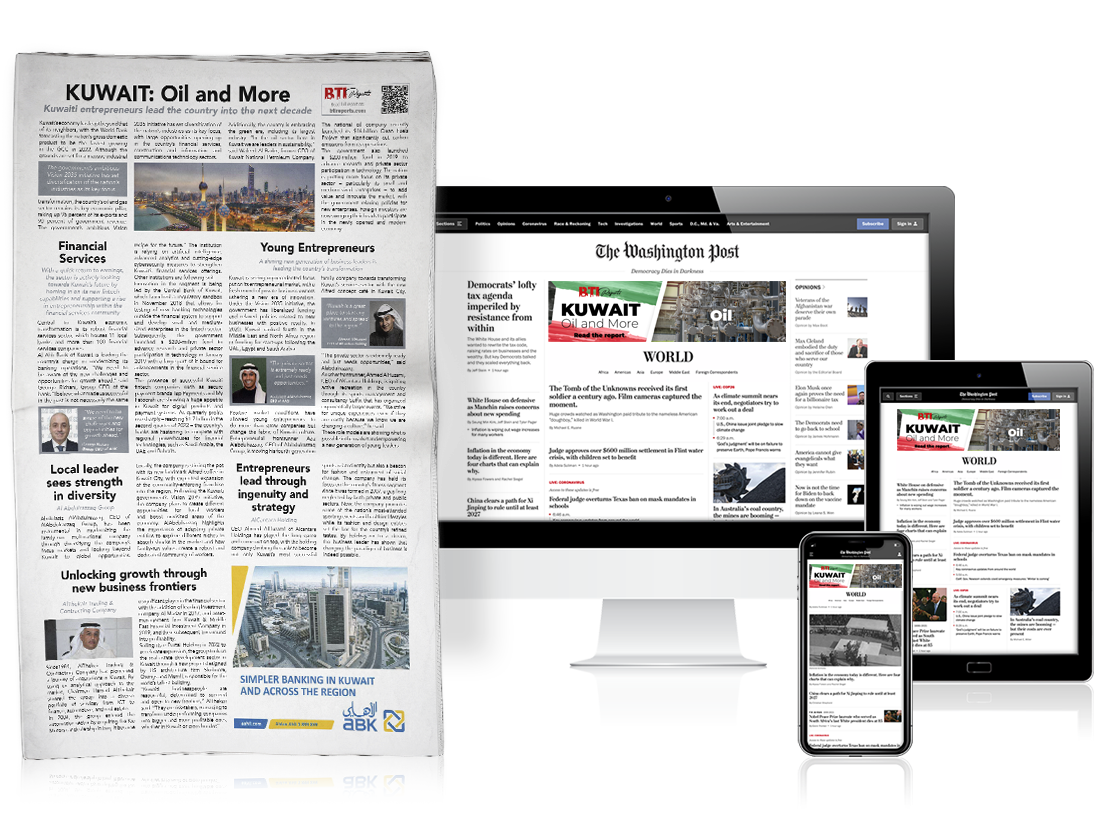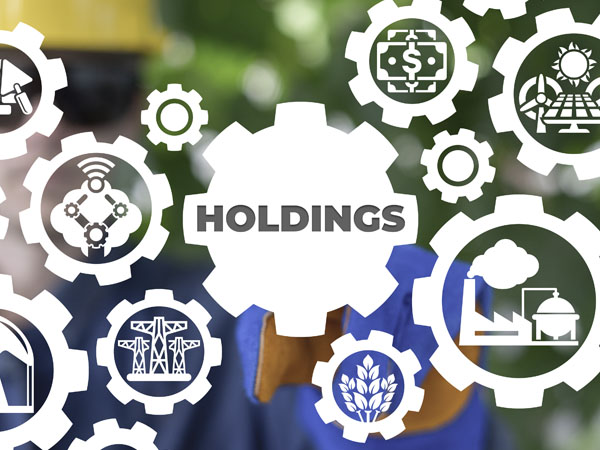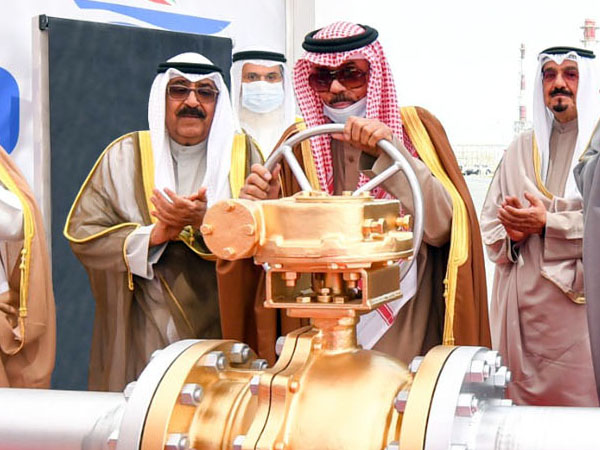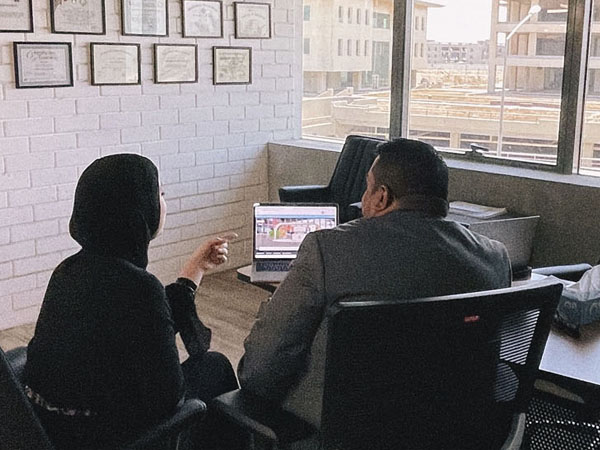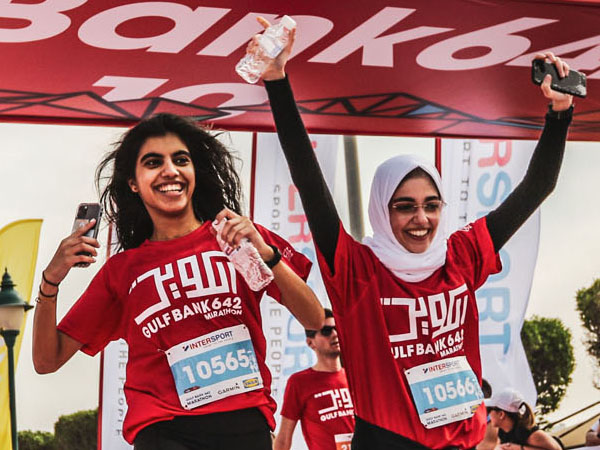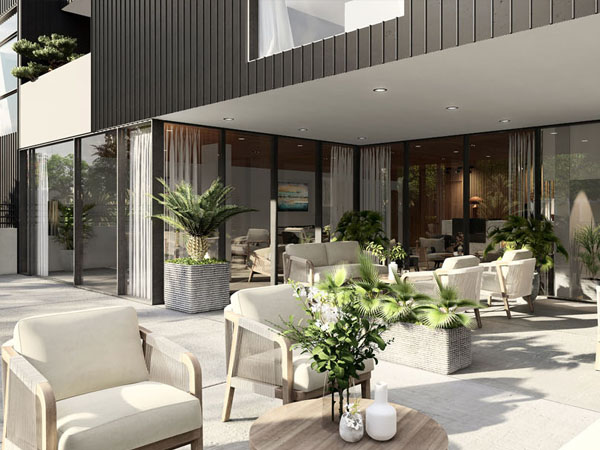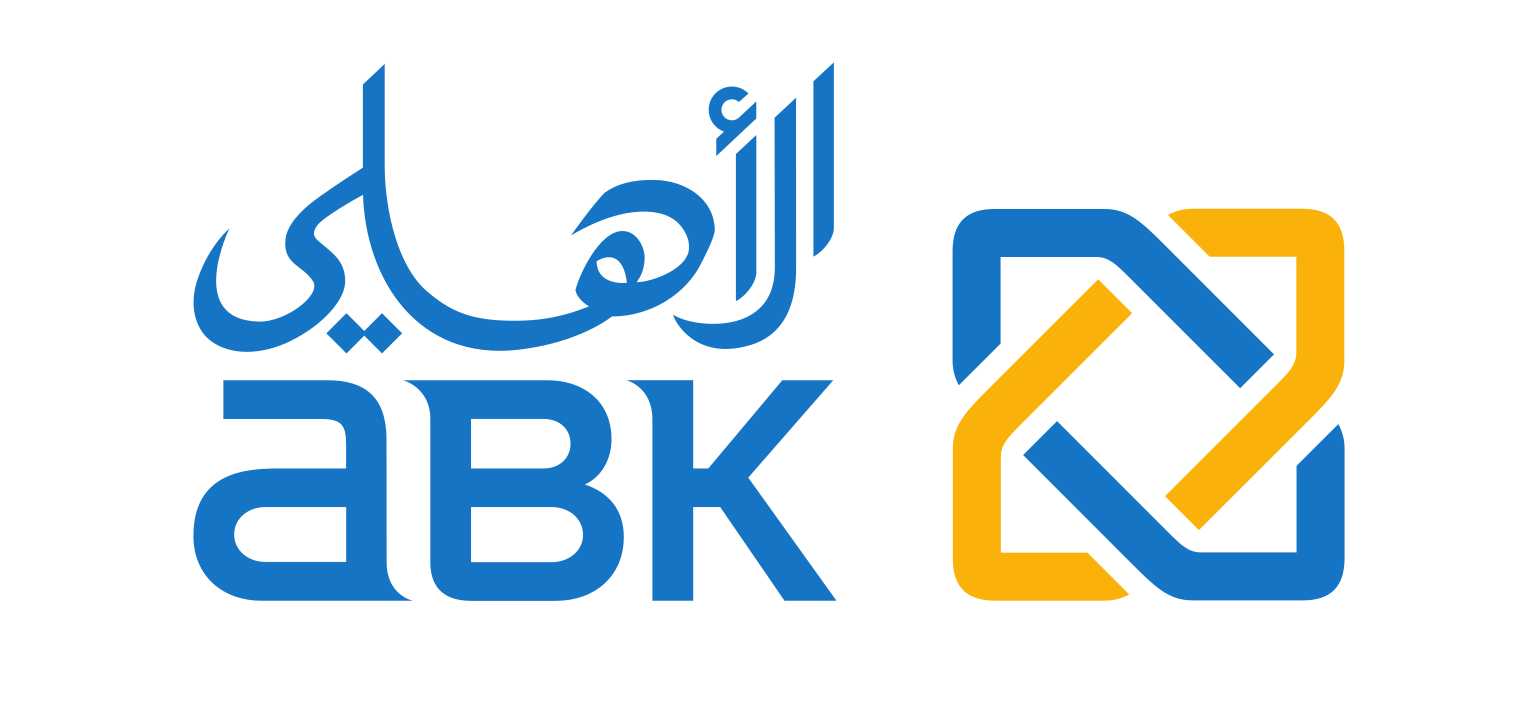KUWAIT
Oil and More
Oil and More
Kuwaiti entrepreneurs lead the country into the next decade
Kuwait’s economy has leapt beyond that of its neighbors, with the World Bank forecasting the nation’s gross domestic product to be the fastest growing in the GCC in 2022. Although the grounds are set for a massive industrial transformation, the country’s oil and gas sector remains its key economic pillar, taking up 95 percent of its exports and 90 percent of government revenue. Due to rebounding oil prices and a rise in local production levels, Kuwait has been sheltered from global constraints caused by the COVID-19 crisis and the conflict in Ukraine. The nation now stands in a prime position to benefit not only in the short sprint but the long run as it shifts its industrial gears.
The government’s ambitious Vision 2035 initiative has put diversification of the Gulf nation’s economy as its key focus. Under the program, the government has created giant supports to promote investment into untouched sectors. Entities like Kuwait’s Capital Markets Authority are leading the country in strategizing new attractive policies for international participation. Under the flagship Northern Gateway Initiative, the country is creating an international economic zone that is expected to pull in investments of more than $400 billion. Additionally, larger institutions such as Al Ahli Bank of Kuwait are now successfully looking beyond the scope of the Kuwaiti market for partners to stabilize and expand the country’s one-sided economy.
The country is also embracing the green era, including its largest industry. “In the oil sector here in Kuwait we are leaders in sustainability,” said Waleed Al-Bader, former CEO of Kuwait National Petroleum Company.
The national oil company recently launched its $16-billion Clean Fuels Project, which enabled production of internationally recognized Euro 4 and Euro 5 standards of production and significantly cut the company’s carbon emissions.
Outside of renewed investment appetite in Kuwait’s oil and gas sector, the local financial services industry is witnessing a revolution on the back of huge demand for digital banking and financing. The nation’s construction and engineering sector is expected to kick into action after the government approved $65 billion in projects in the 2022-2023 budget, including an airport expansion and rail links to improve the country’s logistics capacity.
Additionally, Kuwait’s information and communications technology sector is expected to explode after the country completed its 5G roll out, with investments readied for artificial intelligence, telecommunications, big data and the Internet of Things.
Another part of the Vision 2035 initiative is the creation of a robust ecosystem to promote entrepreneurs. The National Fund for SME Development was established to fortify small and medium-sized enterprises with a capital of $6.48 billion.
In 2017 the government began to relax its licensing policies for new enterprises and saw a huge turnaround from local financiers taking a sharper look at what these businesses had to offer. Now small and medium-sized enterprises generate 11.9 percent of Kuwait’s gross domestic product by gross value added and maintain the livelihood of tens of thousands of its citizens. With continued support, the segment is expected to grow.
articles & interviews
Oil
ESG goals sustainable in the future
Financial Services
Becoming digital
ICT
Enabling digital transformation
Young Entrepreneurs
A shining new generation of business leaders
Diversified Conglomerates
Tradition meets innovation
KNPC
Focus on innovation sees huge returns
AlThekahir Group
Kuwaiti entrepreneurs find success in new frontiers
AlAbdulrazzaq Group
Local leader sees strength in diversity
AlCantara Holding
Entrepreneurs lead through ingenuity and strategy
Suffix
Locals fight the odds to raise awareness on the importance of sports and healthy lifestyle
Razzaq
New homes for a new world
Oil
ESG goals sustainable in the future

The oil and gas sector is also the country’s central node in spurring innovation and corporate social responsibility.
Kuwait’s oil and gas sector continues to be the Gulf nation’s largest and most significant industries and is now being seen as the main vehicle for change as the country advances its environmental, social and corporate governance goals. The sector accounts for almost half of the country’s gross domestic product, 95 percent of its exports and 90 percent of the state’s funding. The oil-rich country contains 7 percent of the world’s oil reserves and has a production capacity of 3.15 million barrels of oil per day. Led by state-run Kuwait Petroleum Corporation, the nation is in the process of increasing its oil production capacity to 4.75 million barrels per day by 2040 and upping its refining capabilities. Leading the charge are the country’s largest players, who are putting sustainability and social change at the heart of the country’s ever-increasing oil and gas operations.
“We continually exert sincere efforts and invest resources to protect our environment and combat our carbon footprint.”
Waleed Al-Bader
-
read more...
Kuwait National Petroleum Company (KNPC) – the refining arm of the national oil company – recently passed two major milestones under the country’s Vision 2035 initiative that aim to cut down reliance on crude oil exports. The first is the $16-billion Clean Fuel Project, which involved linking Mina Abdullah refinery with the company’s Mina al-Ahmadi refinery to create an integrated complex with a total capacity of 800,000 barrels per day. The development upgrades the facility’s products to meet Euro 4 and Euro 5 standards and significantly cuts down on the company’s carbon footprint. “We continually exert sincere efforts and invest resources to protect our environment and combat our carbon footprint,” said Waleed Al-Bader, former CEO of KNPC. Alongside the project, the state refining company started up its fifth liquified gas train at the Mina al-Ahmadi refinery in March 2022, boosting production by 30 percent.
Kuwait’s downstream sector also passed another significant hurdle with the commissioning of the 615,000-barrels-per-day Al Zour refinery in November 2022. The Middle East’s largest refinery is located around 55 miles south of Kuwait City, has a production capacity of 615,000 barrels of oil per day and accounts for 43 percent of Kuwait’s total refining power. Leading the $16-billion facility is Kuwait Integrated Petroleum Industries Company, which is also committed to lowering the country’s carbon emissions. The project includes six atmospheric residue desulphurization units.

The oil and gas sector is also the country’s central node in spurring innovation and corporate social responsibility. For example, KNPC has spearheaded a break from tradition towards conducting corporate hackathons and Ideas Together campaigns, which now make up the bulk of the entity’s brainstorming processes. “We motivate company employees to think outside the box and come up with ideas,” said Al-Bader. “It might be a small thing, but it has a big impact.” Additionally, the company actively seeks to support the Kuwaiti population wherever it can. For example, KNPC extended its medical teams to the entire population during the COVID-19 pandemic.
Movers & Shakers
Mr. Waleed Al-Bader
Former Chief Executive Officer
Kuwait National Petroleum Company (KNPC)
Prioritizing Clean Fuels
A prominent player in the global hydrocarbon industry, KNPC has reached new milestones in its bid for sustainability. The completion of the Clean Fuels Project, which mitigates fundamental aspects of polluting actions, makes a major contribution to the preservation of the environment. Former CEO Waleed Al-Bader discussed other aspects of the company’s social responsibility and its plans for growth.
“One of the most important reasons for our outstanding financial results is that we completed the Clean Fuels Project (CFP) in September 2021, which adds value by bottom-of-the-barrel upgrading.”
Mr. Waleed Al-Bader
-
read full interview... -
In May 2022, you announced that Kuwait National Petroleum Company (KNPC) recorded a 133% increase in its net profit during the fiscal year 2021-2022 compared to the previous year.
What are the reasons behind these outstanding results?
And what are your projections for the current fiscal year?I think one of the most important reasons for our outstanding financial results is that we completed the Clean Fuels Project (CFP) in September 2021, which adds value by bottom-of-the-barrel upgrading. We were ready to capitalize on product margins that started to increase in the fourth quarter of the calendar year, and that gave us six months in the last financial year to benefit from CFP commissioning by producing more high-value products out of a barrel of crude.
For FY-2022/2023, we started positively, and financial gains during the first four months are unprecedented—but since August, the refining margins have dropped due to the economic and geopolitical situation. Therefore, considering the good performance till July, we anticipate promising financial results this year if the products’ crack margins continue to be in our favor over the coming months. -
KNPC is planning to pump nearly 1.3 billion Kuwaiti dinars (US$4.2 billion) into new projects as part of its long-term development strategy stretching until 2040.
What projects does the company want to prioritize with this investment?We had two major projects which are the CFP and the 5th Gas Train. Now we are working on building a new Petroleum Products Depot, to be located in North Kuwait, for meeting the local market demand. This is something major, although not as big as CFP.
Another major project we are working on is expanding our petrol filling stations (PFS) network, for which we have a set plan to establish 180 PFS by 2040. They will be scattered around Kuwait, and all will be powered by solar energy. Also, we are studying the requirement of building a new gas processing facility to accommodate the anticipated increase in gas production from upstream. -
The completion of the Clean Fuels Project marks a milestone on KNPC’s development.
Could you please describe to our readers the main impact of the project for Kuwait’s and the global downstream industry?The CFP was a must for us. We are now capable to produce petroleum products meeting all international specifications of every legislation, which allows us to export our products to any region without losing market share.
On the other hand, the environment improvement impact of the project is also quite large on our operations because this project mitigates fundamental aspects of our polluting action i.e., SOx (Sulphur Dioxide) and NOx (Nitric Oxide) emissions, and with it we have also upgraded all our old units to become environmentally friendly.
So the main impact for both Kuwait and rest of the world is the reduction in impact on the environment with consumption of environment-friendly clean fuels, allowing us to maintain our competitiveness in the global markets. -
One of the consequences of the CFP is that KNPC begun exporting petroleum coke and diesel products.
What are the main markets the company wants to compete in?Anything related to the international marketing of our products in handled directly by KPC International Marketing. However, because I was the head of this division of KPC in the past, I can answer your question. We target different markets in Asia, Europe, and some markets in Africa.
We now have the capability to meet the requirements of any market, so we can export globally.
-
KNPC is fully engaged to adopt innovative ideas and fully realize its potential, such as advanced concepts in management, refining technologies and other fields.
What are your main management principles?Innovation is one of the values we are focusing on to develop and embrace new ideas and methods to overcome the challenges faced by the business. We formed an innovation committee years ago and developed the Innovation Strategy in 2018 to promote the culture of innovation via several activities such as Corporate Hackathons, the Building Innovation Studio, awareness and design thinking workshops, and Ideas Together campaigns.
Our objective is to encourage all our staff, regardless of their position in the company or nationality, to come up with ideas. Hackathons and Ideas Together campaigns are the main sources of ideas at KNPC today. In addition to other channels, we placed a board in the VIP entrance to our facilities, where employees can write down their ideas. We are encouraging innovation at all levels.
Well-established processes for the innovative-ideas cycle include screening, evaluation, coaching, top-management approval, assigning ownership for implementation and recognition. We motivate the company employees to think out of the box and come up with ideas; it might be a small thing, but it has a big impact. For example, the use of a mobile application to read data and monitor without having to enter a processing unit. This saves a lot of time and is also safer for our people.
With regards to my management style, my way of trying to take the company to a different level is by encouraging and motivating the workforce to achieve set objectives and goals, as well as being clear and transparent in all dealings. I let people understand what I am thinking about and share expectations with them.
I share almost everything with my deputies, and I encourage them to share everything with their subordinates while maintaining the confidentiality needs of business requirements.
After four years, now I try to reflect on transparency, and I encourage this throughout the organization. It is extremely important to let people know where we are and where we are going.
I meet employees regularly to motivate and encourage them to ask questions. I always answer in one of these three ways: I give them the answer they seek; I don't because I don't know the answer but promise to investigate it and get back to them; I tell them I cannot answer their question because of administrative procedures if that is the case. -
Sustainability is at the core of KNPC activities. The company has started to implement some environmentally friendly activities that you have mentioned and others.
How would you summarize KNPC’s stance regarding sustainable practices?In the oil sector here in Kuwait, we are leaders in sustainability, and we are proud of this. We maintain a set strategy of transforming KNPC into a fully environment-friendly refining company. Therefore, major steps are taken to address greenhouse gases (GHG) emissions, waste reduction and management, recycling, leak and spill detection and prevention, vapor recovery systems, phasing out of halon (an ozone depleting substance), energy-consumption optimization and other related activities. We have executed numerous projects in recent years to reduce our footprint, most important of which is the CFP. We have flare gas recovery units installed in the two refineries to reduce SOx, COx and other GHG emissions. These projects are registered under the Clean Development Mechanism of the UNFCCC (United Nations Framework Convention on Climate Change). Work is underway regarding the installation of solar energy systems at KNPC’s petrol filling stations. We continually exert sincere efforts and invest resources to protect our environment and combat our carbon footprint.
KNPC has been committed to reporting on the company’s sustainability initiatives for 14 years. The company has adhered to the latest index for sustainability reporting and has been consistent with reporting our sustainability pillars of environmental performance and initiatives toward environmental protection, social awareness and contribution, and economic performance and profitability. -
Another pillar of the sustainability strategy of the company is its Corporate Social Responsibility. The company supports several projects on the areas of education, culture, environment, health, and safety awareness.
Could you please describe the programs to which the company is most committed?The welfare of all our employees and contractors is key to ensuring that KNPC operates to the highest standards within the oil and gas industry. KNPC firmly believes in supporting and protecting the health, safety, welfare, security, and dignity of each worker on its projects. Ethical recruitment and employment practices, safe work practices, as well as safe and healthy living and working conditions are critical elements to KNPC’s way of delivering work.
KNPC recognizes that welfare arrangements and quality facilities not only improve workers’ health and wellbeing but also enhance performance, efficiency, and health and safety compliance. KNPC is committed to comply with the applicable national and international laws/standards such as Kuwait labor law and E&S standards including, IFC PS 2012 standards.
There are many social initiatives that we take part in, but perhaps I am most proud of the ones that helped humans in times of need. I can mention that during the COVID-19 pandemic, we set up a large tent, brought in our medical teams and encouraged the population to come and get examined and get treated if necessary. This was open to every member of our society, not just our employees.
Also, during the holy month of Ramadan we set up another tent where everyone was welcome to come and break their fast and get fed.
In the oil sector here, we are not only building a new Kuwait, we are also building the future and moving things forward despite the challenges faced by the country.
To give you an example, on March 11th, 2020, the government announced closure. It was a very challenging time, but we could not afford to halt all work. We addressed all the issues the international contractors were facing and managed the commissioning of the CFP. We continued working during the complexity of the pandemic and overcame several and important challenges to be where we are today.
-
In May 2022, you announced that Kuwait National Petroleum Company (KNPC) recorded a 133% increase in its net profit during the fiscal year 2021-2022 compared to the previous year.
Financial Services
Becoming digital

One of the Kuwaiti government’s current key areas of focus is its robust financial services sector, which houses 11 local banks and more than 100 financial services companies. The local banking industry took a hit during the COVID-19 pandemic with a sharp dip in net annual profits to only $1.6 million in 2020. However, banks saw a second consecutive rise in profits in the second quarter of 2022 that beat out the entire year of 2020, reaching $1.7 billion in quarterly profits only. With a quick return to earnings, the sector is actively looking towards Kuwait’s future by homing in on its new fintech capabilities and supporting a rise in entrepreneurship within the financial services community.
“We need to be aware of the new challenges and opportunities for growth ahead. I believe what made us successful in the past is not necessarily the same recipe for the future.”
George Richani
Demand for a competitive fintech market is growing. A total of 50 percent of Kuwait’s population is between 15 and 39 years old, with 70 percent of those between 15 and 24 using banking platforms. This has changed the market both in demand and in a rise in fresh trainees ready for a career in new sectors. Additionally, online banking usage rates are high, rising to 84 percent during the pandemic period. The presence of successful Kuwaiti fintech companies such as secure payment brands Tap Payments and My Fatoorah and real-estate payment platform Ajar Online are showing a huge appetite for digital products and payment systems.
-
read more...
Innovation in the segment is being led by the Central Bank of Kuwait, which launched a regulatory sandbox in November 2018 that allows for testing of new banking technologies outside the financial system to support and develop small and medium-sized enterprises in the fintech sector. Subsequently, the government launched a $200-million fund to advance research and private sector participation in technology in January 2019 with a large part of it bound for advancements in the financial service sector.
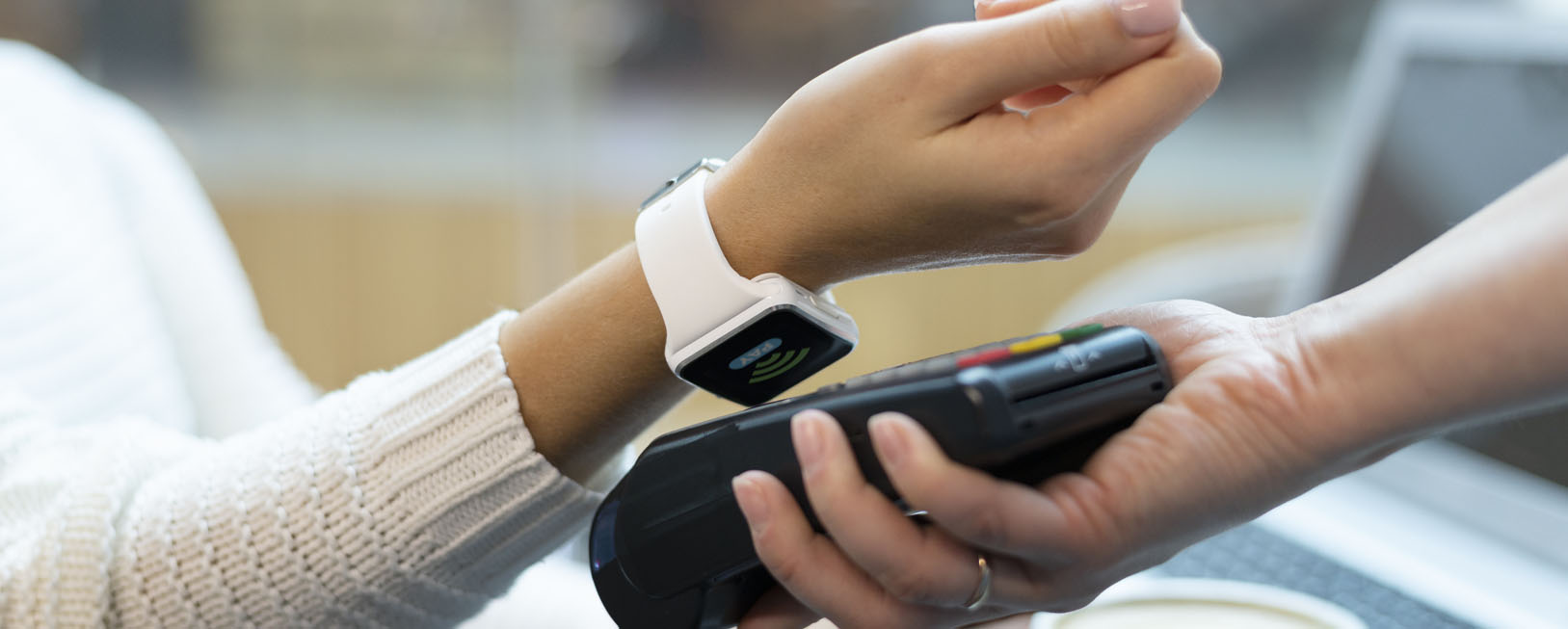
Al Ahli Bank of Kuwait is leading the country’s charge in modernizing its banking operations. “We need to be aware of the new challenges and opportunities for growth ahead,” said George Richani, Group CEO of the bank. “I believe what made us successful in the past is not necessarily the same recipe for the future.” The institution is relying on artificial intelligence, advanced analytics and cutting-edge cybersecurity measures to strengthen Kuwait’s financial services offerings. Other institutions are following suit. National Bank of Kuwait launched its SmartWealth personal investment platform in 2019 and Kuwait’s first digital bank Wayay in 2021. Boubyan Bank also joined Kuwait’s digital banking revolution in 2020 with the release of its new Fitbit and Garmin smartwatch payment system. At this point the country is set to compete with regional markets in becoming the next hub for new financial technologies, such as Saudi Arabia, the UAE and Bahrain.
Movers & Shakers
Mr. George Richani
Group Chief Executive Officer, Al Ahli Bank of Kuwait (ABK)
Conservative in Approach, Ambitious in Objectives
Group CEO George Richani attributes Al Ahli Bank's turnaround from losses in 2020 into profit a year later to its conservative approach and solid foundations. However, ABK has no intention of resting on its laurels: as the Kuwaiti financial sector becomes ever more competitive, Richani plans to stay ahead of the curve by refining the group's strategy with an eye on the future.
“We need to be aware of the new challenges and opportunities for growth ahead. I believe what made us successful in the past is not necessarily the same recipe for the future. There are new entrants into the market, and the nature of the game has changed and will continue to change."
Mr. George Richani
-
read full interview... -
Al Ahli Bank's results for the first half of the year showed a substantial increase in both net and operating profits. Net Profit grew by almost 20 percent while operating profits increased by 13 percent compares to the same period of last year. And noticeably earning per share grew by 29 percent.
What would you outline as the main drivers of these results?We have embarked on a 3-year full transformation strategy with a top American consultant since the beginning of the year, and slowly but surely we’ve started seeing the results of this turnaround strategy. The three pillars of our transformation strategy are: (1) Scale & create value (2) Sustain & de-risk (3) Innovate & enable. The strategy will touch on every aspect of banking at ABK including the Corporate Bank, the Retail Bank and Overall Risk Management, we will not leave any stone unturned. A big part of the transformation is related to our people and lots of effort is being devoted to attracting the best and ensuring our current staff have the trainings they need. In fact, we have engaged in training the entire staff of the Bank on change management and the top executives on leadership skills within a transformation. We are also focused on Kuwaitization and succession planning of the key positions in the Bank.
-
What would you highlight as the main measures taken during the first half of the year?
This transformation strategy is very key to our success in the future, and we have mobilized the whole bank in this direction. The measures taken during the first half of the year were to mostly to mobilize all our staff and resources in this direction.
-
On August 16th, 2022, ABK announced the signing of a Memorandum of Understanding (MoU) between Al Ahli Bank of Kuwait and Gulf Bank regarding the proposed acquisition of one of the two banks over the other. One of the banks might become a Sharia-compliant Bank. This proposed merger was in the makings before Covid 19 pandemic started, and it has now been retaken.
What would this merger mean for both banks’ shareholders?This is not going to be a merger as the main shareholders of the bank are adamant not to lose jobs, and to keep the two banking licenses. It is going to be an acquisition. It is important to note that we have not yet started the due diligence work at this stage. We only received the approvals of the Central Bank of Kuwait to start the pre-due diligence work which was disclosed in the Kuwait Boursa only recently. This phase will be a prelude to the due diligence phase but is not an automatic approval to start the due diligence work. Phase one will only figure out the structure of this acquisition and the strategy going forward, and of course which bank will become Islamic, and which one will remain conventional and therefore who will be the acquirer and who will be acquired. Once this study is done and is submitted to the Central Bank of Kuwait, both banks will then seek the Central Bank approval to move to phase two and to start the due diligence work.
Therefore, it is too early to say anything more about this potential combination between the two banks.
-
What are the synergies involved and how would this impact Kuwait and GCC banking industry?
I expect the synergies will be derived mostly from revenue synergies with also some cost synergies. That said, again I must reiterate that it is too early to say at this stage as phase one will handle those questions with greater details and depth. Only then we can say with more confidence what are the exact synergies involved.
We have only high-level assessment of the impact on Kuwait Banking industry. That said, the study that we will be making during phase one and the result of this study that we will be submitting to the Central of Kuwait for approval to go phase two will undoubtedly contain an important and detailed part analyzing the impact on the Kuwait banking industry. -
Within the Vision 2035 framework, Kuwait’s financial industry is set to have even a bigger role than before in the country’s next phase of development.
What are the challenges and opportunities faced by the industry?Kuwait is a very progressive country with a bright population. But while Kuwait is rich, it’s also small and, unfortunately, the economy is not diversified. It is truly a "one-commodity economy," with 90% of the country's revenues coming from oil.
Vision 2035 is ambitious, and in my opinion, the real challenge to fully achieve and implement the vision is the legal framework. One of the advantages Kuwaitis have is they’ve proven to be good investors with great business acumen. Kuwaitis are entrepreneurs by nature, and the potential for SMEs is huge. The young generation of entrepreneurs is making its mark, and I believe this will only increase. -
ABK’s strategy bets on a growing regional and domestic business. The bank started operations in UAE back 1977 and Egypt in 2015.
What is the mid- and long-term international strategy of the bank?As I’ve mentioned, Kuwait is still dependent on one commodity, and there is volatility in its economic performance depending on oil prices. We cannot be captive to this, and that's why we needed to look outside our borders. So, if Kuwait is not doing well because oil prices are down, we have other sources that balance our performance. I think about it as “a diversified portfolio of countries.”
We choose our locations carefully. An international presence is on our agenda; a future presence in a financial center like the UK is clear, but we will do it at the right time, when the right opportunity presents itself. -
A major concern for any financial institution is cyber fraud.
What actions is the bank taking to avoid this great risk?We save no money, we save no effort, and we save no time on this. At ABK we have two important assets: one is a tangible asset, our people; the other is an intangible asset, our reputation. So we cannot afford not to safeguard the bank against cyber fraud.
Cybersecurity is not a luxury, it's a must. It's one of our biggest assets. If we lose that, we lose a lot. We use the best available systems in the world to help us ensure that we are protected from such attacks. We also test all our systems continuously to close any gaps immediately. We hire professional technical companies all the time to test our systems and report our weaknesses. We correct them promptly; we are always on the move in this regard.
Moreover, we recently participated very actively in a banking awareness campaign initiated by the CBK, along with the Kuwait Banking Association, called Diraya in Arabic and “Let's Be Aware” in English. In addition to cyber awareness, this campaign deals with several topics, such as the borrowing processes, bank cards, the rights of customers with special needs, mechanisms for filing complaints, and generally detailing the functions of the banking sector. We are using all possible channels to reach and educate our clients regarding these issues. The Diraya campaign is a priority for us; we want to ensure the messages are received by the public.
-
Al Ahli Bank's results for the first half of the year showed a substantial increase in both net and operating profits. Net Profit grew by almost 20 percent while operating profits increased by 13 percent compares to the same period of last year. And noticeably earning per share grew by 29 percent.
Prof. Ahmad A. Al-Melhem
Chairman of the Board of Commissioners and Managing Director
Capital Markets Authority (CMA)
Capital Gains
In 2017, the CMA embarked on a multiphase plan to develop the capital markets, together with Kuwait Clearing Company and Boursa Kuwait. Gaining the recognition of the top international rating companies increased the inflow of investment to the market, and upcoming privatizations plus new regulations should make Kuwait even more attractive to investors.
“The listing has grown because of the increased trust in the market. By attracting investment to Kuwait, we have greatly increased the liquidity of the market.”
Prof. Ahmad A. Al-Melhem
-
read full interview... -
How did the Capital Markets Authority (CMA) develop in Kuwait?
This is the oldest market in the Gulf. In August 1983, it was established as a regulated market, the exchange market, by Emiri decree. The market was managed by a committee comprised of the public and private sector. It had the responsibility of a regulator and market supervisor, and of the execution of the transactions.
Yet combining all those duties is not compatible with the international standard, as there are governance issues. When the 2008 international crisis hit, Kuwait took a special look at the financial sector. And in 2010, parliament issued a law establishing the CMA. The board of commissioners was appointed one year later, the bylaws were established, and the CMA began its mandate. It also became a member of the joint committee of the CMAs of the Gulf. -
How important was it for you to become part of the International Organization of Securities Commissions (IOSCO) and to gain other international classifications?
Very important, so we submitted our request to enter IOSCO in 2014—but there were gaps in our law. We succeeded in amending the gaps by 2015 and went on to establish the regulations for the CMA to manage the whole sector through a massive number of bylaws. Finally, Kuwait resubmitted the application to IOSCO and we became a full member in 2017.
Our vision was to invite the international investors to our market, and we had a barrier concerning the differences between the weekend here and in the West. So, we converted to the post-trade model for delivery versus payment, T+3, and this eliminated the differences. This step was very important to be reclassified by FTSE Russell—and we were then promoted to a secondary emerging market by them.
And after that, we began thinking of developing the capital market as a whole, so we established a joint committee between the CMA, Boursa Kuwait—the exchange market—and the Kuwait Clearing Company (KCC). The committee made a plan that consisted of four phases.
During that time, in 2018, we had also been promoted to emerging market by Standard and Poor's (S&P). And in 2019 we were promoted by MSCI. This achievement was possible because of the development of the market and the work of the joint committee.
FTSE Russell, MSCI and S&P Dow Jones have all decided to upgrade the Boursa Kuwait and classify it as an emerging market, which helps to attract both institutional and private investors to the exchange. -
What have been the main steps taken thus far in the development of the exchange market, and what are the future steps to complete the process?
The impact of this reclassification in the evolution of the Kuwait capital market has been massive. It is an international standard that has changed the image of the market. Being recognized by the three biggest international rating companies—trusted by both non-Kuwaiti and Kuwaiti investors—increased the inflow of investment. Before the reclassification, the inflow of non-Kuwaiti investors was about half a billion Kuwaiti dinars; now, it is around five billion Kuwaiti dinars, and the number of institutional investors has increased.
Currently we are in the process of cleaning the market of what we call “paper companies” and specializing on the added-value market. The listing has grown because of the increased trust in the market. By attracting investment to Kuwait, we have greatly increased the liquidity of the market.
We also succeeded at the privatization of the exchange, Boursa Kuwait. This is the first instance in the country, and our Vision 2035 stipulates that we should spur the private sector to take a leading role in the development of the country.
-
Kuwait aims to become a leading financial services global hub. The country already possesses a solid financial system.
What are the comparative advantages of Kuwait as a financial hub?Kuwait has the third-highest GDP in the GCC and the most liberal political environment. We have a very sound and a trusted judiciary system which gives the international investor the guarantee that if there is any conflict, he will get justice. Of course, the CMA and the Central Bank of Kuwait are following the best international standards; Kuwait follows the 38 IOSCO principles. We have reached 95% in compliance, but following our latest assessment, I think we will reach 100% soon.
We are also launching the privatization program, having begun with Boursa Kuwait and following with the Shamal Az-Zour Power Plant, which is already listed, and another public-private partnership company in healthcare.
The government companies owned by the Kuwait Investment Agency or by the oil sector are on the road to privatization. We have government authorities specializing in granting facilities to SMEs, and we have an authority for public-private ownership.
Furthermore, we have Silk City, a master-planned, 250-square-kilometer city in northern Kuwait, now in the form of a draft law hopefully to be approved in parliament. This will represent a real revolution in Kuwait; Silk City will be like a country inside the country. It will have a local government to deal with combining the city with Mubarak Port. This should attract international investors. -
Kuwait has a solid entrepreneurial culture, ready to lead the way to a new phase of development with a diversified and innovative economy.
What role does the CMA play in sustaining Kuwait's entrepreneurial drive?We have a four-year strategy consisting of around 132 initiatives. We have already established the Fintech program, and we will shortly establish a unit dealing with innovations and SMEs; the steering committee is established, the executive committee as well, and our consultant is working with the committees to establish the Fintech framework and regulation.
There is a draft law in parliament to grant CMA the role of regulating crowd funding so as to encourage small businesses, enterprises and innovators to collect funds under our control. This would give assurance to the shareholders that the CMA is behind them, protecting them, encouraging them to share innovations.
We have already amended our bylaws to establish a venture capital fund. This will accommodate the small businesses or the high-risk businesses. It will help businesses start, giving them the support and the expertise to grow and then to be listed in the exchange.
The exchange is also planning to create a platform for the SMEs to be traded. Furthermore, family-owned companies are a big component of the economy, and we encourage them to be listed in the exchange. These are old companies, maybe 50 or 60 years old. We are shaping the road for them, and we made an amendment to our bylaws to encourage them to be listed.
We are planning for a future where we don't depend only on oil.
-
How did the Capital Markets Authority (CMA) develop in Kuwait?
Sheikh Ahmad Duaij Al-Sabah
Chairman of the Kuwait Banking Association
Committed to Thriving
Chairman of the Commercial Bank of Kuwait, a board member of several Kuwaiti institutions, and recently appointed Chairman of the Kuwait Banking Association, Sheikh Ahmad Duaij Al-Sabah believes the banking sector can be a catalyst of private sector development.
“New streams of revenue and new services will make us, as banks, the backbone of the private sector. We are the link between the future and the past, able to fund the future value chain and the ambitious projects of today.”
Sheikh Ahmad Duaij Al-Sabah
-
read full interview... -
The pandemic put all countries around the world under considerable pressure, and Kuwait was no exception. Disturbances in global supply show us that overcoming the impact of the pandemic is not going to be easy. The Kuwait Banking Association (KBA) is the unified voice of the banking sector in Kuwait.
What are your priorities at the KBA in this scenario?As we all know, we are living in a COVID world. And as you can clearly see, we are now in our boardroom, which earlier was not connected through audio and visual. Now we all have become a lot more digital, we conduct a lot more online meetings with our partners across the globe.
We have to navigate through this new world, where fundamental ideas, visions and relationships remain but the instruments to achieve our goals have changed. We have passed the moment when our companies had to survive; now we are committed to thriving and reinvigorating the economy.
On a banking level, we will build up our reserves. And this is under the guidance, instructions, and mandates of the Central Bank. They have proven their worth by navigating the storms of the pandemic, and we have been able to create stimuluses from our own private sector rather than from the public-services economy. Being able to delay retail payments for six months has certainly helped the private sector.
After the upheaval that happened at the beginning of the pandemic, demand has been reinvigorated. That started pulling up the supply side, but people didn't expect it, and it did affect procedures as well as industries and their ability to cope with the increase in demand.
I think that's going to stabilize soon enough, and we will be moving towards a normal level rather than a pent-up demand.
I see this with the recovery of air travel when I talk to our clients, and we will start to see a lot more. We also see this recovery through the balance sheets, goals and plans that the public and private sector bring to us. -
The rise in energy prices, consistent since last quarter of 2021 and exacerbated by the geopolitical tensions in Eastern Europe, is helping Kuwait’s recovery.
How do you assess this scenario?I think governments have learnt to limit the importance of oil revenues within their budgets and come up with new segments.
New streams of revenue and new services will make us, as banks, the backbone of the private sector. We are the link between the future and the past, able to fund the future value chain and the ambitious projects of today.
-
Vision 2035 emphasizes a bigger role of the private sector in the efforts to diversify Kuwait’s economy and bring innovation.
To which extent is the Kuwaiti private sector ready to take on this role?Much as oil is the lubricant of this economy, SMEs do the same in other countries. The private sector alone is leading the provision of the services and satisfying the needs that people either don't see or see coming.
We need to be more dynamic and more maneuverable as far as SMEs are concerned, and that goes from coffee shops and restaurants to payment services or Fintechs. Small businesses have the ability to really switch directions.
That´s why KBA is focusing on the SME departments, and we'll try to do our best to help them with their funding.
SMEs are always more difficult to analyze. We focus on their balance sheet, but there´s still inherent risk. Overall, they are nimbler, able to get closer to the final consumer.
Now the SMEs have the spotlight to try new things. As a sector and also as this association, banking tries to act as consultants that can help the SMEs achieve the desired results. And the only reason we can do that is because we deal with a multitude of clients. -
Another goal of Vision 2035 is for Kuwait to become a global trade and finance hub.
What are the main challenges banks are facing today?We really have embraced digital payments and are trying to provide as much as we can through our apps. I think it's a very, very exciting time for digital solutions in the region. There is huge ambition across this region, and these visions are materializing at breathtaking speed. This is creating a positive dynamism.
Everyone is competing across the region; it is a productive competition that is benefiting us.
I think we will be learning from our regional cousins, taking the best innovations and the best approaches and the best new ideas and implementing them here.
Keep your eyes on the region, especially in Kuwait’s role as a critical player within it. A lot of things are changing, a lot of things are moving, as well as our needs. We need catalysts of change, tools to change, plans to achieve change. There's a huge opportunity in providing new solutions and variety, in trying to achieve customer wants rather than needs.
-
The pandemic put all countries around the world under considerable pressure, and Kuwait was no exception. Disturbances in global supply show us that overcoming the impact of the pandemic is not going to be easy. The Kuwait Banking Association (KBA) is the unified voice of the banking sector in Kuwait.
ICT
Enabling digital transformation
Kuwait’s telecommunications sector is vast, containing five operational internet service providers, three mobile phone operators and an abundance of authorized distributors. The country’s capacity is speeding up, with its 5G roll out the latest in a series of fast deployments as technology advances exponentially. Analysts expect local telecom services in Kuwait to have a growth rate of 6.4 percent per year between 2021 and 2026, with fixed broadband services seeing an average annual rise of 17.2 percent until 2026. Companies in the market are now actively focused on raising capacities and slicing out new opportunities as the country hits the next era of digital communication.

“Outside of Kuwait, 5G remains in its infancy.
Kuwait could be an innovation hub for the region.”
Sam Darwish
The government is keen to develop the sector, with telecommunications a key focus in the government’s Vision 2035 program. The state officially launched the Communication and Information Technology Regulatory Authority in 2016 to approve new licenses for companies and upgrade the country’s national telecom infrastructure. As part of the country’s digital transition, state-run oil and gas company Kuwait National Petroleum Company signed a memorandum of understanding in March 2021 with the Organization of Arab Petroleum Exporting Countries to digitize the country’s largest sector through information and communications technologies.
-
read more...
Leading Kuwait’s digital transformation are some of the country’s fastest innovators. Ooredoo Kuwait is largely focused on the business-to-business segment that was lauded as having the fastest 5G fixed-broadband service in Kuwait in 2021. The company’s My Ooredoo app has been downloaded more than a million times. Beyond speed, the company has invested heavily in cybersecurity to retain its competitiveness. “We initially built security as an optional service,” said Abdulaziz Al Babtain, CEO of Ooredoo Kuwait. “Today, our clients are happy as they have no need for their own information technology security departments.” The company is now focusing on digital finance.
“We cannot only focus on the simple application of 5G, we must also focus on how this serves massive connections and enterprise demand.”
Maziad Alharbi
STC Kuwait was established in 2008 and has continuously pushed the envelope, including being the first to offer 5G to customers. Maziad Alharbi, CEO of STC Kuwait, is always looking five steps ahead. “We cannot only focus on the simple application of 5G, which is higher speed,” he said. “We must also focus on how this serves massive connections and enterprise demand.” The company’s AHEAD strategy launched in 2019 is based on constant transformation, which has led to a partnership with Virgin Mobility in 2021 and the acquisition of one of Kuwait’s leading ICT companies, e-portal Holding Company, in 2022.
Another leading player is IHS Towers, which joined the GCC region through a partnership with regional telecom Zain as the first independent tower operator in Kuwait. The international powerhouse has around 39,000 towers in 11 countries across three continents. Sam Darwish, Chairman and CEO of HIS Towers, sees the nation as filled with opportunity: “Outside of Kuwait, 5G remains in its infancy. The country is advanced, and we want to go deeper into the market. Kuwait could be an innovation hub for the region.”

Young Entrepreneurs
A shining new generation of business leaders
The Gulf region is seeing an unprecedented amount of focus put on fostering entrepreneurs, and Kuwait remains a firm contender. Under the Vision 2035 initiative, the government has liberalized funding, relaxed policies related to new businesses and opened up the market to the private sector to challenge the status quo. In response, young entrepreneurs are coming out of the woodwork to transform both the Kuwaiti economy and culture.

Leading the charge are a shining new generation of business leaders. Entrepreneurial frontrunner Abdulaziz Alabdulrazzaq, CEO of Alabdulrazzaq Group, is moving his fourth-generation family company towards transforming Kuwait’s services sector through acquisition of the GCC franchise rights for Alfred, a concept café established in Los Angeles, USA. Beginning in Kuwait City, the restaurant concept involves the promotion of various community initiatives while changing the face of socializing and networking. “The private sector is extremely ready and just needs opportunities,” said Alabdulrazzaq. “There is an important entrepreneurial culture in Kuwait.”
Other key front runners include Ahmad Almajed CEO of Suffix and Ahmed AlHuzaimi CEO of AlCantara Holdings, who are igniting active recreation in the country through their sports management and consultancy entity Suffix that has organized events that have grown exponentially. “The culture of the country was completely against what we were trying to do,” Almajed said. “Changing this mindset was our biggest challenge.” AlHuzami agreed: “We discovered that governments were not putting their attention in the field of sports, which created a fantastic opportunity.” The company now runs between 60 to 80 sporting events per season and is reaching for regional expansion.
-
read more...
Kuwaiti’s shining entrepreneurial stars also include Abdulaziz B. Al Loughani who launched flowers and e-commerce platform Floward and co-founded popular delivery app Talabat and founders Athbi Al Enezi and Nouri Al Enezi who started justclean, an on-demand laundry service that received $20 million in funding. These trailblazers together spearhead an economic and cultural revolution with entrepreneurship at the front of the charge.
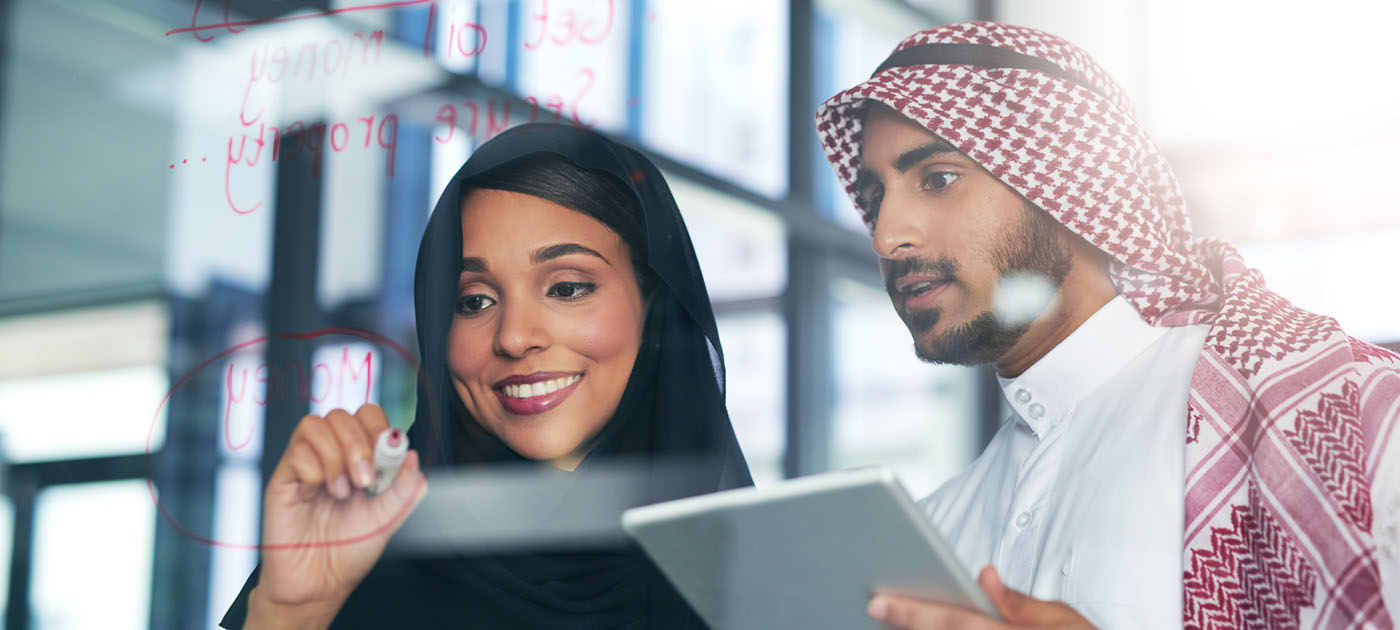
Similarly, the country is seeing a regulatory push for small and medium-sized enterprises. The country’s lead entrepreneurial entity National Fund for SME Development has a total capital of around $6.5 billion. From 2016 until 2019, the fund assisted around 870 businesses and heavily engaged with the state to ease related policies.
“The private sector is extremely ready and just needs opportunities. There is an important entrepreneurial culture in Kuwait.”
Abdulaziz Alabdulrazzaq
As the sector expanded, private sector platforms have also joined the fray to assist entrepreneurs such as Kuwaiti multinational telecommunications giant Zain Group. The company’s Zain Great Idea tech start-up accelerator program saw $4.5 million in investments handed to its 170 participating start-ups in 2021 and aims to raise this number in the following years. Small businesses such as The Taken Seat – which describes itself as a start-up of start-ups – are now gouging out spaces for themselves in supporting the rise of the next generation of unicorns.
Movers & Shakers
Mr. Abdulaziz AlAbdulrazzaq
CEO of AlAbdulrazzaq Group
Leading by Example
A member of the fourth generation of family entrepreneurs, Abdulaziz AlAbdulrazzaq has inherited a hands-on approach to business combined with the lessons of successive economic crises. Understanding that the private sector will lead Kuwait's economy into diversification, he believes it's essential to seize opportunity wherever it arises.
"There is an important entrepreneurial culture in Kuwait. A true entrepreneur needs to know how the business works and what everyone does, and this has been passed down to me by my family."
Mr. Abdulaziz AlAbdulrazzaq
-
read full interview... -
AlAbdulrazzaq Group has been active for more than 70 years. It has expanded to seven countries, the United States among them, and is present in eight sectors and growing, with more than 88 business partners.
What would you pinpoint as the most important milestones in the evolution of the group and the challenges along the way?Kuwait's is a small country’s economy. A lot of the three to four million people inhabiting Kuwait are on the labor side of construction and servicing, so they don’t enter the criteria for consumers and customers. Your actual customer base is about 400,000 to 500,000 because a large part of the 1.5 million local population is of an older generation. But in fact, Kuwait has been pioneering in business since the GCC started. We are ruthless in terms of competition considering we have only about 500,000 potential customers. I'm the fourth generation in business; my great-grandfather started the company with partners before the oil boom. They used to trade with India and the GCC.
When the countries of the Gulf got introduced to oil, the family started investing in the GCC and very heavily in Kuwait. My grandfather invested on a couple of companies in the stock market and founded a bank in Bahrain. We partnered with international companies like Kodak, and Nikon from 1951. We made two heavy investments in the GCC, but in the late 90s we also invested in two companies in London. That's when we saw the difference between a global approach and our local economy. But what really motivated the family was the stock crisis in the 80s. I think Kuwait at the time was the third-largest stock market in the world and completely crashed. The second motivation in the early 90s was the Iraqi invasion. The third crisis in 2008 was global, but the Kuwaiti market was hit so badly that only this year have we gotten back to the 2008 level. In 2018, and after serious consideration, I started investing abroad. The family was reluctant at first, but then we tested the market, and it was very successful. I found it important to have something in the US, something in Europe, and something in the GCC. Asia we have not yet entered yet. -
The group is now a diversified family business that ranges from engineering to interior design. You are in marine infrastructure, wellness, construction, and real estate, recently venturing into food and beverage and securing the franchise rights for the popular LA café Alfred.
What is your strategy when adding new ventures to the portfolio?Nowadays, I look at how the business will behave in recessions or in hard times. For example, you mentioned the coffee houses: Coffee is addictive. Good coffee is addictive and people hang out at coffee shops. Alfred is a destination, it's not just where you get your coffee before work in the morning. During the day, people want to hang out, and Kuwait is a small country; everyone knows everyone. Coffee houses are where you do business and meet friends. Alfred is a relaxed, fun, and hype place. I lived in LA for five years, where I tasted the concept. So we acquired the rights for seven countries.
We like to look at projects for all ranges of consumers. In the past, we've been involved in the government’s heavy projects, but these depend on how oil is doing and how the government is sponsoring it. We had many projects with the government, which is an amazing partner, but its priorities can shift from one day to the next, and that is unsustainable for any company. We shifted investments, although the family was very reluctant. They were betting heavily in real estate because it's safe. So the shift comes when you ask honestly: How can I diversify away from my main income?
-
In 2018, the group expanded operations in the United States with the incorporation of Razzaq, a multi-disciplinary design, development, and building company located in Los Angeles.
What do you bring to the real estate market in the United States?We have partnered with a development company from the US. They manage our projects and we invest in their projects. In 2018, we incorporated and bought a share of our partner's company. And when investing in real estate development, we buy projects, or land, build new projects, design them. We have different approaches, whether it's for apartments, houses, or townhouses. Coming from an Arabic background, we design our houses in a completely different way than in the US.
We have adapted the Arabian concept to the US lifestyle: several living areas, larger family rooms, bigger bedrooms with walk-in closets and total privacy. In the GCC we are used to having maids and help living in the house, and US homes are not built with this in mind. By adapting GCC concepts to the new US lifestyle, we are stepping ahead. In exteriors, our homes are not white boxes that look the same. The only thing that we do the same are what we call modern barns. Since we have started, we have always presold-out the modern barns. The longest one of our projects stayed on the market was four months. -
What other projects do you have in mind in Los Angeles? Or are you planning to expand to other areas of the US?
In the future, we are looking at Florida and New York to expand, but at the moment we are focused in LA, where there is a housing crisis. In Los Angeles, we have a project in Brentwood that will be completed by end of this year or beginning of next year. It's a US$ 30-million home of about 40,000 square feet and designed in the Arabic style with unobstructed views of Catalina.
Another project is Holmby Hills; it's placed between Bel Air and Beverly Hills, and it only offers estates of an acre-plus. These do not have the Arabic design, but they have an Arabic feel. There are a couple of living areas, you have a pajama lounge next to the bedrooms, you have a formal area, you have a massage room and a library. The project is organized to accommodate house help, with formal and informal lounge areas. Then we have smaller modern projects in Westwood, Santa Monica, Venice, and Mar Vista Playa. -
Coming from a family-owned group, you mentioned the importance of diversification. Kuwait Vision 2035 calls for a Kuwait with a diversified economy and the private sector as the engine of growth.
Do you see the private sector ready to take the reins of the country's economy?The private sector is extremely ready and just needs opportunities. We've seen during COVID how the private sector stepped up and helped the country in a time of crisis. There is an important entrepreneurial culture in Kuwait. A true entrepreneur needs to know how the business works and what everyone does, and this is has been passed down to me by my family. I believe in leading by example; this mindset is part of my family legacy.
Although companies may be part of a holding, I believe they should be run separately because one company can be suffering, yet another can be thriving, and then they won't be pulling each other down. So we will continue to invest, and in five years we will be fully diversified globally in terms of sectors and regions. Our investment arm in the US is preparing for more investments since it is in times of crisis when you can get the best return.
-
AlAbdulrazzaq Group has been active for more than 70 years. It has expanded to seven countries, the United States among them, and is present in eight sectors and growing, with more than 88 business partners.
Mr. Ahmed AlHuzami
CEO of AlCantara Holding
A Heart for Sports, a Head for Business
As athletes with a passion for sports, the founders of AlCantara Holdings could not be dissuaded from creating a company focused on sports by a tepid reception in the business community. The public reacted differently and rewarded their persistence with an avid interest that has turned them into the leading holding of its kind.
"In terms of purchasing power, in terms of education, I think Kuwait is the trendsetter of the region—a great place to start any ventures that then spread to the other countries. We have started some ventures I have seen copied in the region."
Mr. Ahmed AlHuzami
-
read full interview... -
AlCantara Holding has its roots in sports. Your subsidiary, Suffix, is one of the region's leading sports management and consultancy companies.
Why did you direct your business interest to this sector?In 2007, we saw a gap in the market with no one actually tapping into sports management or entertainment in the region and specifically in Kuwait.
My partners and I, being sports enthusiasts, decided to study the market to see if there’s a scope for it. We soon discovered that the government in this part of the world was focused on investing in oil, gas and stock market more, which meant that if we decided to get into this industry we would be on our own. We also did our extensive research and found out that there were only a few companies in the region in this industry, which were mostly led by international companies. That also gave us an indication that this is going to be a tough market to get into, however it will give us a very fruitful result in the long run being locals who understand the cultural part very well.
We were perplexed on this concept and our passion for sports pushed us to keep trying. Being in a high-income country and having people who don’t understand the importance of sports and fitness, we were focused on bringing awareness with this venture.
For the first seven years, no one was actually even interested to listen to us and work with us. Today, we're in a completely different position because of the consistency and the persistence we put into this. -
What entertainment sports event are you most proud of?
For me, maybe the spark was in 2014, when we launched the 642 marathon--an event that we believe showcased our capabilities to the entire region. We had no sponsors supporting the event so we took the risk of investing ourselves into the event and we put a lot of thought into the details as well as a lot of hard work to make it reach the international level marathons around the world. I attended myself and I ran in Boston, New York, Chicago, Berlin, London Marathons.
We started with 200 people; just before COVID we were 10,000 people running the same marathon. -
The creation of sports facilities and the hosting of large events have been some of the areas growing the most in the GCC.
Countries like Qatar or the UAE have invested largely in the sector.
Do you think Kuwait is also going in this direction?Kuwait has been going in that direction for maybe 40 or 50 years now. The infrastructure needs to improve, however.
We strongly believe that Kuwait has a lot of great characteristics that even the region does not yet have. In terms of purchasing power, in terms of education, I think Kuwait is the trendsetter of the region—a great place to start any ventures that then spread to the other countries. We have started some ventures I have seen copied in the region. The construction of infrastructure in the countries around us is actually speeding up, and governments are putting a large effort toward that.
-
What are the competitive advantages of Kuwait in respect to its neighbors?
Purchasing power, education and awareness are some of the most important.
People here start traveling early, and they know what's happening in the world. So when we started introducing sports, for example, people knew that there was something called marathon, that there was something called triathlon. They knew it but had never seen it; they had never seen it in their own homebase. So they wanted their kids to join.
Imagine seeing all these tickets actually sold out when we started. And to this day, at most of our events 90% of the tickets are sold out among the thousands of events a year. And this is very competitive compared to any European market even. -
When did you switch from sports to the rest of your portfolio?
When we thought strategically about AlCantara, we studied the other groups to understand their evolution. We found that most of the great groups in the region were spread into different ventures, and today you see them having divisions under each business line.
Our strategy was set two years ago, and it was to have sports and non-sports businesses segregated in terms of management.
We want to be more focused in sports. We want to be investing more and more in the sports industry to be the leading holding company in the region focused on sports and growing horizontally.
We have many groups here in the region focused on sports, but they have other businesses like automotive, fashion, real estate; that's not the case for us.
So when we talk about sports, we talk about sports management and entertainment in sports, with many business lines available. We have the events, we have facility management and construction, media rights, athletes and retail. -
How would you describe the new breed of Kuwaiti entrepreneurs like yourself?
I think we got a fantastic and solid support from the government in education. Personally, I got the chance to be educated in Spain, which meant engaging with people, knowing and learning, and which gave me and a lot of young entrepreneurs a great foundation to start.
Secondly, this country is built on creativity; people do not want to copy-paste other businesses but to innovate.
Kuwaitis like novelty and quality. People are very much interested to have top-notch products. They are always curious to discover the best things happening in the world.
It is in our DNA: Kuwaitis are very competitive. We want to win, and that's something good if we take a competition in a healthy way. This mindset creates a fantastic ecosystem that connects us all.
We're lucky to be in such an emerging market in such a promising era. The development of technological platforms is there to help us build Kuwait, which is a great place to start as pilot. -
What's your growth strategy for the next five years?
We want to focus more on building our businesses first. We’re currently working on certain benchmarks set in Kuwait, once achieved our next steps would be taking these businesses to different countries. We're going strategically into the region. In 2023, our goal is to go heavily for Saudi Arabia. Our objective is to be the largest and oldest sports management and entertainment company in the GCC, not specialized in a particular sport but in all of them.
-
AlCantara Holding has its roots in sports. Your subsidiary, Suffix, is one of the region's leading sports management and consultancy companies.
Mr. Ahmad AlMajed
CEO of Suffix
Healthy Prospects
Believing that the Kuwaiti market would favor a bold vision, Suffix saw a gap in the market in terms of sports facilities and events and rushed to fill it. The result? A profitable conglomerate that is encouraging and empowering a healthy lifestyle.
“When we started, we had a little over a 100 people doing outside events; last season we had over 62,000 participants, which is great for such a small country with Covid-19 restrictions. Sports has become a lifestyle because we created a movement, not just a business.”
Mr. Ahmad AlMajed
-
read full interview... -
In 15 years, Suffix has managed to become the region’s leading sports management and consultancy company.
You claim to aim farther and higher:
Could you tell us more about the philosophy that led to your success?We started off in 2007 when there was hardly any sports culture in the country. There was no business sense in creating a sports management company, the only thing we had was the vision and our belief that sports was something important and fundamental and we have since been tirelessly working hard to change the mindset of society to see the importance of it. We wanted to influence our country to adopt and create healthy lifestyles which will be reflected and followed by the upcoming generations. We wanted to start a movement. 15 years later we are proud to say that what we have accomplished is something we never imagined would’ve been possible. Kuwait is not one of the most popular countries in the GCC region but we’ve strived to put it on the map as one of the best experiences in sports. In our initial years, we would have a maximum of 120 participants from within and outside of the country, last season we had over 62,000 participants, that’s a great achievement for a small country like Kuwait going through Covid-19 restrictions.
-
What challenges have you faced by creating a business that would change a culture?
The biggest challenge till date we have faced is the mindset of the people. It was very difficult for us to change the mentality and impose the importance of a healthy lifestyle. Everyone around us in the beginning did not understand what we were doing, why we were so keen on sports but today we can proudly say that we have a fingerprint in the community as the pioneers of sports events and facilities. There have been many new businesses after us that have grown with the same mindset ranging from healthy food brands, gyms, clubs, retailers in sports and a lot more.
As a company, we are really excited to see, 30 years from now, how figures will have changed in terms of the onset of diabetes from obesity. These figures can change depending on the implementation of healthier lifestyles.
We want to invest in sports as recreation—not only as a business, but to ensure the health of future generations. -
In terms of the events themselves, what kind of change have you seen?
I could say we are successfully encouraging other young entrepreneurs by taking the first step towards sports and fitness. Many new businesses have been established after us. Sports was a neglected submit which is now being emphasized on by schools, universities, clubs and a lot more. That for us is more valuable than the profit we're making at the end of the year. The legacy we are building will last forever.
In fact, we're dealing with huge research firms to understand the impact of Suffix in real numbers. I'm not talking about the direct consumers who are already coming to our events or to our facilities, but what our impact is in terms of how many businesses after us started riding the sports and health trend, how many health restaurants, how many gyms, how many retailers related to the industry opened.
-
One of the most relevant features that Suffix Sports Management offers is the Li3ib app.
Could you please describe how to use it and what features it incorporates?Li3ib is a very unique app designed with a lot of thought. It covers both business-to-business and business-to-consumer aspect of the industry.
The app gives you all the options available in a geographic location. You choose your sport, you choose your time, choose the needs and the requirements, and then the app gives you the times available, and of course it helps the ultimate goal, which is perfectly healthy living.
It's a great tool for booking anytime you want, and for the business owner it's a great marketing tool as well.
We have booking and management metrics to use on the app and the management as a service.
It's important to note that in our solutions and in everything we do, we want to complement and partner with people. We don't see ourselves as a competitor. Others may frame us as competitors, but we're not. If you want to use any kind of solution from the services that we're offering, you're welcome because the whole community would benefit, and that is our ultimate goal.
This is where we want to get to at the end of the day, but while having the majority of the market share. -
Tell us how the pandemic impacted your business and what are your expectations for the coming years in terms of the number of events that you will be managing and the audiences that will attend them?
The pandemic was a great challenge and an opportunity in disguise for us because we really stretched our team’s creativity to find solutions. Of course lockdown and curfews meant that we could not host any events which is a complete shutdown on our business, but we took it as a chance to create ideas that didn’t require gatherings. We strongly believed that we’re in this together, and did not let go of any of our team members, we encouraged new ideas and worked around to make them happen while facing the lockdown.
Normally, in events you have to go to a physical location and get your kit or your race number, go race and then get your award.
We developed a complete system for the pandemic: We built a trailer and inserted several vending machines, and we moved it around the country. To register, you went to our website or app and signed up for any virtual event of your choice. After signing up you went to one of the vending machines and scanned your invoice, with no human interaction whatsoever. You got your kit, your race number, your goodies, your T-shirt through the machine. And then, on the app, there was virtual tracking through which you could time your activity yourself and instantly have your ranking. After you finished, you would receive a notification and then go to the vending machine to receive your medal.
We thought of the whole journey very carefully and integrated all systems together to make the whole process very quick for the end-user.
We got international exposure through this solution for the pandemic. A large conference called One Marathon Participation World, the biggest conference of its kind in the world, happened virtually. I was on the panel with the president of New York City Marathon, the president of Spartan Race, the head of ASO, the company that organizes the Tour de France, and all the big players in the industry.
It really opened a door for us internationally. -
What would you consider your main competitive advantage as a sports management and consulting firm?
I think it's our business model of concentrating in sports and offering all the services around it. We're offering a high-quality service with very competitive pricing because of efficiency.
Our whole 360-degree solution has no comparison in the Middle East. The offer we proposed in Kuwait is now expanding because of its uniqueness, and we are doing events and managing facilitates throughout the region.
We see ourselves doing events internationally very soon. We have the capability, and we have the content, the infrastructure, and the team to become a global company.
Another advantage is that it's better to deal with one stakeholder than ten in terms of communication, efficiency, and accountability. Of course, it depends on the scale of the event as well of the project, but fewer stakeholders yield the best results.
-
In 15 years, Suffix has managed to become the region’s leading sports management and consultancy company.
You claim to aim farther and higher:
Mr. Musab Al-Mutawa
Co-Founder & Co-CEO of The Taken Seat
A Startup of Startups
Start, develop, exit is the philosophy of success for The Taken Seat. A venture builder that seeks to disrupt entrepreneurship in the MENA region and beyond, The Taken Seat identifies opportunities for businesses to become a new generation of unicorns.
“We always try to hit the ground running. When we think we have something good, we validate it by looking into what’ s next and how to reach there.”
Mr. Musab Al-Mutawa
-
read full interview... -
Before The Taken Seat, your first entrepreneurial venture was Carriage. You founded, accelerated, and exited Carriage after 18 months, with an undisclosed but apparently juicy package.
How was Carriage created, and how was the transition towards The Taken Seat?Abdullah, my brother, is the idea-generator type in our family. He came to me and to my late father many times with different ideas, none of which I particularly liked.
One day towards the end of 2015, he had the idea of potentially founding something that allowed consumers to track their orders. We started brainstorming and we came to the quick realization that it was something interesting to consider. At the time, Amazon had just acquired Souq, and the entrepreneurial community was preoccupied with the idea of Amazon taking over the region. So the question for us was: “How could we compete with Amazon?” We could only compete with the speed of delivery. While with Amazon it could take three days to a week to get your merchandise, we could deliver it on demand.
First, we needed to build the logistics infrastructure; our challenges were how to adapt it to and how to implement it in a non-vertical city. On-demand deliveries were done in New York, San Francisco, London, Hong Kong, but never really done in suburbia at the time. In fact, on-demand platforms looked at population density as a factor for expansion. So companies kept on noting that unless they hit “X” in terms of population density, it was not going to work; if they wanted faster deliveries, they needed smaller radii. The challenge was how to supply to a 15-km radius rather than 2 km.
We decided we'd start with food for two major reasons. First because with food we'd get stickiest consumption, and second, we'd get faster exit potential.
I think about the exit at the beginning. I’d summarize my business philosophy as: “Grow, grow, grow and exit”. A lot of people disagree with me, but I think I'm a pragmatic and realistic person. I personally believe you have a fiduciary responsibility towards always contemplating exits for your investors.
For that project we realized there would need to be an important tech component, and I contacted a good friend of mine from Stanford who agreed to join us. We also talked to another good friend, and that is how we started.
We ideated towards the end of 2015, the beta launch took place in May of 2016, and we then got acquired in May of 2017.
I think we positioned ourselves well in a model that combined innovation with aggregation and with a business model that allowed us to do certain things that our competitors at the time couldn't really do.
We exited but stayed on board for several reasons. By the time we left, at the end of 2018, we had grown the company about twenty times, we were in six different countries, and had a little under 1,000 people working with us. We were incredibly overworked, with over 16-hour days every single day, which for this region is highly unusual. We took a short break, not even a week, and started brainstorming again.
We predicated what we’d build next on it being massive in scale and scope, otherwise the opportunity cost in terms of our private and social lives would be too high. We very quickly came to two realizations about the region: Number one, the entrepreneurial ecosystem within the GCC and more broadly, the MENA region is quite underdeveloped, and it is also an environment where it’s tough to find talent and good success stories; number two, as a result, there are hundreds of low-hanging-fruit opportunities that no one is working on.
So we thought, let’s disrupt entrepreneurship in the region and build the next set of unicorns—and this is how inadvertently we came up with the idea of The Taken Seat. -
In your website, you describe The Taken Seat as a startup of startups.
Could you elaborate on the meaning of this sentence?We were trying to figure out how we could describe ourselves to others. We are a venture builder that has the drive and capability to create massively successful companies regionally. At least starting regionally and maybe even beyond.
-
Tell me a about the strategy behind taking a startup onboard The Taken Seat.
We have two different paths.
On the one hand, there are ideas that are fully initiated and built by us, for which we try to find someone to co-found with us. They are first-time startups with no previous experience in an area where no one's working or the people tangentially working on it are not doing such a great job. If we have an interesting, innovative, smarter approach, or at least we believe we do, then we build it ourselves.
The second path is to partner with earlier stage startups, with founders whom we like and are motivated, into building something interesting when they lack something.
We don't necessarily do an excessive amount of outreach to those companies, but occasionally either we reach out or they'll come to us asking for advice, and there we decide if they have something interesting.
Currently, in our portfolio, we have around nine companies or so, ranging from health tech to Fin Tech. We are not focusing on any sector. We are industry agnostic, very exit centric and platform adjacent.
We really like platform markets. Platforms create natural barriers to entry, purely through network effects. Network effects are a very important component of platform markets and very tough for copycats or competition to enter. -
How do you go from incubating the idea to accelerating that idea?
Growth is a major component of what we try to do, and we work very fast. We always try to hit the ground running. When we think we have something good, we validate it by looking into what’ s next and how to reach there. With this in mind, I try to raise funds and convince investors to join.
Entrepreneurs are not going to wait for the perfect opportunity.
You must navigate and pivot throughout the journey, sometimes even day by day. What differentiates startups is the mentality: it's ticking every theoretical box, or most of the theoretical boxes, and going for it.
I don't expect every startup of mine to succeed. In fact, I think the majority will fail.
-
Is there one that you have a particular attachment to?
I really work hard to not be emotionally attached in a way that makes me take irrational decisions, but that doesn't mean that an emotional connection doesn't happen.
Emotional attachment sometimes makes you do the wrong thing, or take the wrong approach, or you're so married to an idea that you forget to pivot.
In our current portfolio there are some companies doing better than others or in industries that potentially provide more of an outwardly social value, that can be a game changer from a social perspective.
I feel very partial to all our ideas. -
How would you assess the new generation and the entrepreneurial spirit in Kuwait?
The older generation, my grandfather's generation, was incredibly entrepreneurial because they were living in poor conditions. The main source of income they had was the sea, living there for four to six months a year.
Spurred by the lack of wealth came the drive to build and succeed; they had to become entrepreneurs.
During the boom of the oil economy, everyone had government jobs and there was no necessity to take risks. Kuwait had a very comfortable social system underpinning everything. Going to hospitals was free, getting your schooling was free, going to university was free, and so on. This lack of need unfortunately did stop innovation.
I feel that now it is time to go back to the old days. The existing political and economic situation is kind of creating the need for innovation and solutions. As life becomes more expensive and salaries don't necessarily rise at the same pace, families, or younger couples, feel the urge to do something.
I took a PhD scholarship from IE Business School. I was making €1,000 after tax and I had to pay €1,000 euros for my apartment, so I couldn’t really afford Wi-Fi. This is when and how my entrepreneurial journey started, out of need. -
Traditionally, you've been focusing on Kuwait, or the GCC, the MENA region.
Should we expect more focus abroad?We are planning something very different to anything we've done before. It will be our first non-MENA investment and will be based out of the US. I'm super excited about the US business and the ability to expand it.
It is also an experiment in terms of any future ventures.
One of the biggest problems that exist within the startup ecosystem is funding. To get proper funding, you need a well-developed ecosystem; you need proper VCs and proper ancillary services.
Most VCs aren't truly VCs. A lot of them are very underdeveloped to the point that I don't think they fully understand what it means to be a VC.
I say this because outcomes for startups usually are binary; either you succeed, or you don't. It's as simple as you either believe this is a startup that succeeds, or you don't. This should be the motivating factor for basing your funding. If you believe it succeeds, then VCs should not nickel-and-dime a startup, which is a huge recurrent issue.
More importantly, VCs tend to also be on the smaller side. So, it's very tough to raise sizable A or B rounds, and near impossible to raise C and D rounds. That's why we have so few of them, and that’s why a lot of local VCs also come to us for help. -
Considering your experience in the region, as well as in Kuwait,
what would you say are the advantages for international investors, particularly coming from the US?Most US institutions invest primarily in US-based startups. They have branched out over the past few years, but only to certain geographic regions: LatAm, India, and very specific parts of Africa. The MENA region gets neglected completely. When talking to them, not having prior investments in the area stops them from having any investments, a catch-22 for startups in the region.
The wider MENA region has over 600 million people, mostly below the age of 30. The majority have phones; some of the largest phone spending across any other geographic area happens in MENA. Egypt watches more social media than any country in the globe.
The majority of the GCC countries have the same characteristics. In this region, you have high disposable income with very little taxation and a really underdeveloped ecosystem that allows for low-hanging-fruit opportunities. There needs to be some form of an allocation towards this region.
This region’s valuations are also significantly discounted relative to US valuations, and yet there are not many mergers and acquisitions happening in the region by some of the larger internationals.
We (both our company and the region) might feel quite niche, but we are also a massive opportunity for VCs considering the region.
-
Before The Taken Seat, your first entrepreneurial venture was Carriage. You founded, accelerated, and exited Carriage after 18 months, with an undisclosed but apparently juicy package.
Diversified Conglomerates
Tradition meets innovation

At the top of Kuwait’s business landscape sits its diversified conglomerates, large and often family-run entities that have been working in the market for decades. Under the government’s Vision 2035 strategy, Kuwait’s private sector is moving away from its vast oil and gas industry towards a more diversified economy, with these entities leading the way in innovating business practices. Imbued with a traditional spirit for business, these legacy companies are proving that experience and tried business acumen are the best way to carry the country towards modernization.
Imbued with a traditional spirit for business, these legacy companies are proving that experience and tried business acumen are the best way to carry the country towards modernization.
-
read more...
A key player in successfully bringing tried-and-tested values to Kuwait’s new economy is Al-Kazemi Group, which established itself as a shipping and logistics entity in the 1950s. The company has seen recent success, including joining in on Kuwait National Petroleum Company’s recently commissioned $16-billion Clean Fuels Project and becoming the authorized service contractor for United Parcel Service in Kuwait. CEO Hussain Abdullatif Al Kazemi attests the company’s high staff retention to its traditional focus: “This loyalty is a testament to the culture and values we try to instill, a management style and philosophy inherited from our late chairman, my father, Abdul Latif Al Kazemi, and which we will pass on to the next generation as the main driver of our longevity and success.”
Al Thekair General Trading & Contracting was established in 1984 as an early player in the country’s information and communications technology sector before moving into other segments such as the regional automobile sector and property development. The company’s established business model is meeting heightened success. In 2017, it acquired Islamic investment and finance company Al Madar Finance and Investment Company, which came from seeing red to a fourfold increase in value. “From there, we ventured to the next one, which had the same issues. We applied the same formula, and we became known for taking sick companies and making them healthier and bigger,” said Hamad Al-Thekair, founder and CEO of the company.
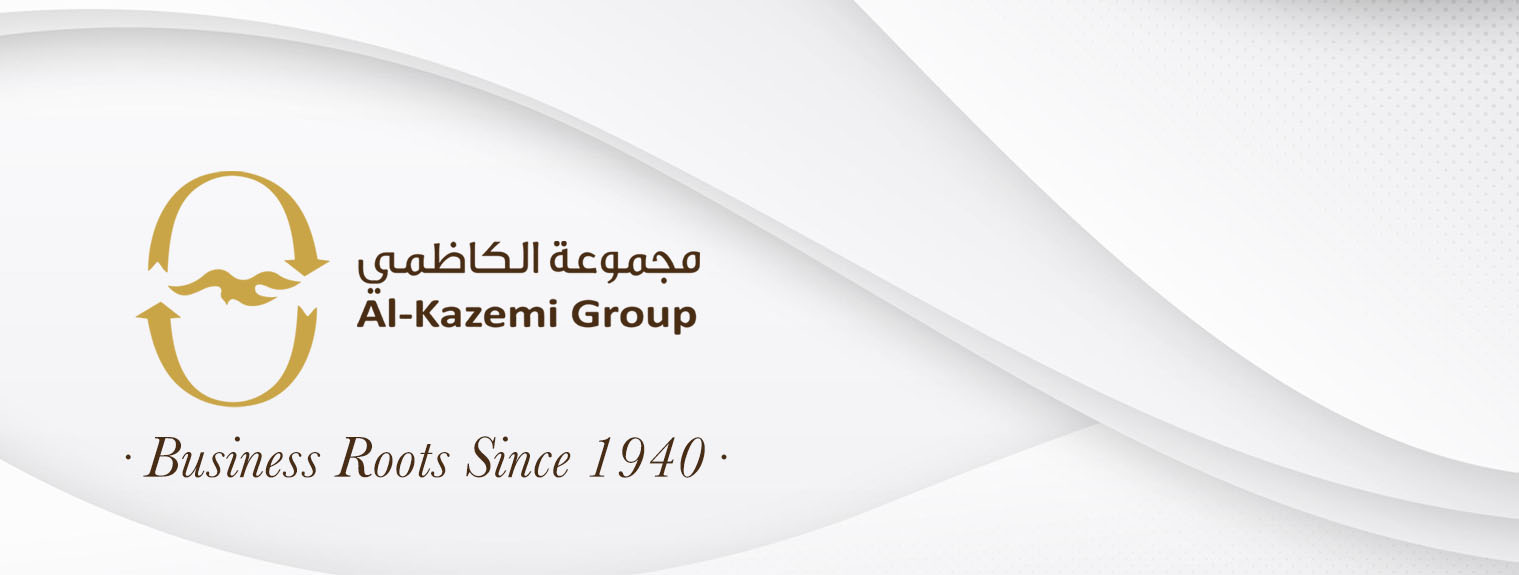
Alabdulrazzaq Group is one of Kuwait’s oldest family companies, with roots extending four generations to a time before the Gulf’s oil boom. The holding firm recently began enhancing Kuwait’s meeting spaces through the acquisition of the franchise rights for US concept-café Alfred and transforming US properties with its luxury real estate subsidiary Razzaq. CEO Aziz Alabdulrazzaq equates the success of Kuwait’s conglomerates to the size of the market: “Your actual customer base is about 400,000 to 500,000 because a large part of the 1.5 million local population is of an older generation,” he said. “Kuwait has been pioneering in business since the GCC started. We are ruthless in terms of competition considering we have only about 500,000 potential customers.”
“Loyalty is a testament to the culture and values we try to instill, a management style and philosophy inherited from our late chairman, my father, and which we will pass on to the next generation as the main driver of our longevity and success.”
Hussain Al-Kazemi
Other Kuwaiti conglomerates that are following in the same footsteps include BoodaiCorp, which successfully introduced the nation’s first non-government-run public transport service and – in 2019 – its new CityBus mobile app. Additionally, Bukhamseen Holding has successfully joined the rise of sustainability through its involvement in developing the 50-MW Shagaya solar farm and Qatar’s first green city, the Green Jewel project.
Movers & Shakers
Mr. Hamad Al-Thekair
Founder and Chairman of AlThekair General Trading & Contracting Company
Engineering Success
Since its establishment in Kuwait in 1984, AlThekair Trading & Contracting Company has been associated with a pioneering journey of acquisitions and approaching new business sectors. Led by its Chairman Hamad Al-Thekair, who has steered the company towards success for almost four decades, the holding company has evolved into a diversified group providing services from ICT to finance, automotive and most recently real-estate by maintaining an analytical approach to problem solving.
“Kuwaiti business-people are resourceful, with great willingness to improvise, strong determination to succeed and openness to new frontiers”
Mr. Hamad Al-Thekair
-
read full interview... -
Al Thekair General Trading and Contracting is today a diversified private group, but you were also a pioneer of the ICT sector in Kuwait.
What attracted you to it at that time?Our company was established in an era when information technology was in its infancy in our region. Despite that fact, we targeted this sector to contribute in the digital transformation and drive the development and innovation of the country. A few years later, we evolved from one of the leading ICT companies in the region into a diversified market player.
-
How does the sale of e-Portal Holding fit in your business strategy?
Selling e-Portal Holding in 2022 enabled us to tackle new industries and accelerated our business expansion, leading into a more diverse portfolio.
We successfully evolved into a diversified group providing a broad range of services from ICT to finance, automotive and most recently real estate while maintaining an analytical approach to problem solving. This transition has helped us develop a deeper understanding of the processes across these industries, maximize our growth opportunities and build an enhanced vision of our next step ahead. -
How would you qualify the main business changes Iraq has gone through since its liberation, and what is your current position in this market?
In 2004, we shifted into the automotive industry and obtained the distribution rights for KIA Motors in Iraq. Iraq has unique characteristics that make it a strategic market in the region. However, entering the Iraqi market was not an easy task; it demanded a great amount of persistence given the serious political instability and challenges. Today, we maintain a key hold through our distributorship and rank as the number one car dealership in the country.
-
The group acquired Al Madar Finance and Kuwait and Middle East Financial Investment Company. Both companies are listed in Kuwait Stock Exchange.
What are the reasons behind your move into finance?We ventured from a leading communication services company into the asset management market and brokerage services with two major acquisitions: Al Madar, a leading investment Kuwaiti company, in 2017 and Kuwait & Middle East Financial Investment Company (KMEFIC), an asset management company, in 2019. We have achieved a significant turnaround in both companies’ leverage and profitability through strategic capital restructuring. We are the majority shareholder of both.
-
Would you link the ability to do this to the skills you acquired as an engineer?
Coming from an engineering background, you learn how to identify and solve problems, to understand professional and ethical responsibility, and to communicate effectively. When you apply this interdisciplinary approach to the real world, it pays off, leading to a new level of growth and restructuring. And today, it has become a passion to approach new businesses and transform them into more profitable ones.
-
Under the development vision for Kuwait, the private sector will take the driving seat, and diversification is the name of the game. As one of Kuwait's leading entrepreneurs,
how would you define the main challenges you are facing to fulfill this role as the engine of transformation? And how is this new development phase impacting your business?As a private entity, we trust that diversification and entering new markets are the utmost way to broaden our reach and boost the bottom line of the business. Furthermore, we appreciate the government‘s efforts to fulfill the development vision of Kuwait and advance the industry by supporting the private sector’s initiatives. By acknowledging the importance of the contribution from the private entities to step up into making more strategic partnerships between the entrepreneurs and the government, we are able to succeed in forming a collaborative model capable of overcoming the challenges and achieving our goals.
-
You've mentioned a couple of characteristics that define a great entrepreneur: aggressiveness and the capacity to tolerate risk.
What would you highlight as the specific characteristics of Kuwaiti entrepreneurs and corporate leaders?Kuwaiti businesspeople are resourceful, with great willingness to improvise, strong determination to succeed and openness to new frontiers. They are risk-taking entrepreneurs who have managed to transform underperforming companies into bigger and more profitable ones, whether in Kuwait or cross-border.
-
Let's talk about the future, about the short and medium term of the group.
What is your next move?Recently, we took on the real-estate development sector in Kuwait by outlining a new construction project inspired by the ocean. The new project is underway and is designed by Skidmore, Owings & Merrill (SOM), the top architecture firm in the United States that designed the iconic Burj Khalifa in Dubai, renowned for being the tallest building in the world.
Our next move will be driven by our openness for new opportunities. We constantly pinpoint a need in the market and identify shifts in consumer behavior. This strategy will provide the right tools to tackle new sectors which will help us create and implement new ideas and innovations.
-
Al Thekair General Trading and Contracting is today a diversified private group, but you were also a pioneer of the ICT sector in Kuwait.
Eng. Hussain Abdullatif Al-Kazemi
CEO of Al-Kazemi Group
Vertical Growth
An eye for the right opportunity, strategic partnership choices and a qualified workforce have made Al-Kazemi Group successful in ventures ranging from the hydrocarbon to the tourism industry. CEO Hussain Abdullatif Al Kazemi now concentrates on vertical growth while believing the private sector can bring more dynamism and innovation to the Kuwaiti economy.
“The increased involvement of the private sector is a sign of growth and of a mature economy that creates opportunities and allows for job creation, greater government revenues and the diversification of the economy.”
Eng. Hussain Abdullatif Al-Kazemi
-
read full interview... -
What would you consider the main achievements of the group in the last ten years?
I believe that being here today is an achievement in itself because the whole world faced the COVID-19 pandemic, which had a huge impact on all economies, including Kuwait. Persevering through that downtime, sustaining the company and making it thrive has been an achievement. But there are quite a few more achievements that I can mention.
We have worked diligently in optimizing our corporate structure, and we’ve offered many opportunities for the younger generation to join different divisions of our company. We believe that the young generation brings the drive, bright ideas and a fresh perspective to the company. That is something that we truly value.
A notable achievement is the partnership agreement we entered with United Parcel Services (UPS). Our sister company Gulf Maritime was appointed as the authorized service contractor for UPS in Kuwait, being formerly a sponsor of its supply chain solutions division since 1997. This new strategic partnership aims at expanding UPS activities and growing its market share in Kuwait.
In addition to that, and if we touch on our activities in the oil and gas and petrochemical sectors, we have been awarded several major scale projects in the past decade, in collaboration with our foreign principals. I’d highlight the Clean Fuels Project (CFP). This was a US$4.5 billion contract we secured covering the Mina Al Ahmadi Refinery (MAA) package of the Kuwait National Petroleum Company (KNPC). The project was executed through a consortium of three major EPC contractors: JGC Japan, SK E&C, and our principal GS Engineering & Construction Corp. -
What are your priorities in terms of growth. Would you say they are reinforcing your current activities or expanding into new ones?
As a group, our focus is primarily on vertical growth, meaning that we aim to expand within the industries where our companies are active. The UPS partnership is an example. Al-Kazemi Group was initially established as a shipping and logistics company. So, basically, our expertise in this industry allowed us to complement the partnership and service its growth plans.
In addition to that, when we develop and expand we're always on the lookout for qualified human capital.
The most important part of any successful company is its people. Having that in mind, we like to always provide a very close-knit environment to our workforce and employees so that they always have a sense of belonging to the company. We have managers with us since the 70s and 80s. Can you imagine working in a company for over four decades? This loyalty is a testament to the culture and values we try to instill, a management style and philosophy inherited from our late chairman, my father, Abdul Latif Al Kazemi, and which we will pass on to the next generation as the main driver of our longevity and success. -
Al-Kazemi is a major player in the oil and gas sector.
What would you highlight as your main projects, both past and current, in the sector?Back in the 70s, we were the agents of Daelim Engineering Company of Korea; we worked as well with Hyundai Engineering. And then, in 1997, we partnered up with GS Engineering, which was formerly known as LG. Throughout that timeframe, we were not only focused on the oil and gas sectors but also active in the infrastructure, construction and power sectors. For example, in 1979 we built the West Doha power plant; we also took part in the rehabilitation of the oil wells in the 90s, post the Gulf War. We undertook hospital construction projects and road projects, among others.
As I mentioned, in 2021 we commissioned the CFP MAA package for Kuwait National Petroleum Company; in 2020 we commissioned the New Water Center project in North Kuwait for the Kuwait Oil Company; in 2019, the North LPG Tank Farm for Kuwait National Petroleum Company.
At present, we are focusing on maintenance and turnaround projects, pipeline lining contracts and bridge construction projects. -
Your company represents more than 35 international manufacturers, providing a wide range of electro-mechanical products.
What characteristics make Al-Kazemi Group a partner of choice for global manufacturers willing to participate in major projects in Kuwait?Let me just highlight that Al-Kazemi Group is not only limited to representing international manufacturers and contractors; we also have a long-standing history representing service providers, airlines and shipping lines.
But back to your question: The long-standing successful business relationships we have developed with renowned international manufacturers over the decades convey trustworthiness to other potential manufacturers looking for a strategic partner in Kuwait. Our history, track record, our team, the qualitative support we provide, our sales track record, and our hands-on approach to deliver successful results allow international companies to entrust us with representing their interests in our market.
-
The tourism sector has gone through big changes in the last decade and experienced a serious backlash during the COVID 19 pandemic.
How does Al-Kazemi Travel Agencies remain competitive these days?As one of the first travel agencies in Kuwait, we were pioneers in this sector, and we still strive to be ahead of the curve and adapt to an ever-changing dynamic.
We aim to establish direct flights to new destinations; for example, we introduced Baku, Azerbaijan as well as Athens, Greece as new destinations back in 2017.
As you have said, the industry took a huge hit due to the pandemic; you had countries closing borders, strict regulations were implemented in airports, and people were reluctant to travel due to the high possibility of contracting the virus. The fact that we persevered through that tough period was an achievement. I would say that Al-Kazemi Travel Agencies today survive because of the vision we have for the company. We are the general sales agents for international airlines, such as Royal Morocco and Pakistan International Airlines. We strive to offer the best deals and packages to our customers, so we work hand in hand with our suppliers.
Customer service is a key factor. In this industry, it’s all about the customer’s experience. Our team is very customer centric. -
As a leader in the private sector,
what do you consider the main challenges the country is facing? And what opportunities do you believe investors should keep their eyes on?The main challenge for the country itself is boosting the economy post-pandemic to create and achieve the required growth. In addition to that, diversifying the sources of income by decreasing the dependency on the oil and gas industries, and of course trying to incentivize the private sector to be more involved, as in any country—which is an indicator of a more mature economy.
We are seeing great initiatives by the government to help the private sector thrive through these challenges, especially with the leadership of His Highness the Emir and His Highness the Crown Prince. Their vision is manifested by many initiatives to support the youth in starting their own businesses, and by establishing the Kuwait Direct Investment Promotion Authority, the entity that allows foreign companies to have full ownership of their business.
The country’s leadership is working to ease and attract investment into the country, and to get the private sector to partake in major projects in different vital sectors such as the power and water sectors.
Furthermore, local private companies are exempt from taxes by the government, a major incentive tool to drive investment. Moreover, the continuous development of the government’s digital infrastructure is helping reduce the bureaucratic cycle, and this can only create a more competitive economy.
The notable opportunities arising in the country are the public-private partnership ventures in wastewater treatment, water desalination, and power projects. In addition to that, you have the BOT projects such as the Jurassic Production Facilities of Kuwait Oil Company as a prime example of a shift in government financing strategies to attract foreign investments and incentivize the private sector.
The increased involvement of the private sector is a sign of growth and of a mature economy that creates opportunities and allows for job creation, greater government revenues and the diversification of the economy. It generates more investment opportunities and expands the marketplace by attracting top international companies, as well as the most qualified workforce, thus ensuring the development of the economy. -
You are the second generation of Al Kazemis to lead the group.
How was the generational transition, and has it in any way impacted the way business is done within the group?As you know, Al-Kazemi Group is a private family-owned company, therefore new generations are going to inherit and take control. I would say that to determine your role, you need to demonstrate your capabilities within the company itself. My late father used to say that you must work like anyone else and earn your way through your own merit. When I graduated and joined the company, I took a few years to work in different divisions and departments. You have to prove that you are competent, acquire the necessary skills, develop, and become a leader; that's what we've always believed in, and that is how it is still done in our company.
-
What would you consider the main achievements of the group in the last ten years?
Mr. Mishaal Al-Usaimi
CEO of Boodai Corporation
Investing Outside the Box
Switching from a reliance on the big development projects of the state to a strategy of investments in consumer-based sectors was the key to Boodai Corporation’s growth and success. CEO Mishaal Al-Usaimi believes Kuwait will see another economic boom if the government opens further sectors to private investment.
“The economy right now is primarily driven by oil or oil-related income, and it doesn't create enough jobs; it doesn't create enough activity; it doesn't serve the consumer in the right way. (…) The private sector needs to create more businesses because it can offer a dynamic responsiveness to customer needs.“
Mr. Mishaal Al-Usaimi
-
read full interview... -
A major trading company established in the 1950s, Bodaai Corporation today manages a portfolio of direct investment with an aggregate turnover of more than US$800 million and over 7,000 employees.
How would you summarize the growth and diversification strategy of the group?The group’s progress follows the same lines as the development of Kuwait itself.
From the early 50s up to the 70s, there was a vast period of physical development in Kuwait; the country was starting from very few bases, and everything needed to be built—the entire infrastructure, roads, ports, airports, etc.
That was obviously where the bottleneck lay, and that's where most of the private sector focused. As the country developed, some families or some businesses chose to follow in that direction and others stepped out their comfort zone.
The transition from one generation to the next, from the 50s to the 80s, was very effective.
And then the 90s were different, with a new way of thinking and more empowerment to the second generation of the family. That's why we have new brands created from scratch, whether it's a CityBus in the public transport area, to an Al Rai on the media side, or Jazeera Airways, that broke the government monopoly in the airline business.
Entering public transport and breaking monopolies started to become part of our group’s DNA and meant a shift in spending behavior. The group went from relying on government development projects to a greater focus on the consumer side. Businesses that were developed post the 90s followed that consumer-spending trend, and we did so, whether it was through the airline, transportation, or media.
The way the group is run has also shifted from a traditional family group operation—the structure of a conglomerate where legacy businesses continue to operate with co-dependency—to entities that basically survive on their own and are financially independent.
Something the world has learned about conglomerates is that the sum of the parts is always less than the parts themselves, and our group has avoided this danger by implementing a quasi-private equity model.
We look at our portfolio, and we rank the companies in it according to their relevance, considering whether they are consumer-based and what their cycle is, and that basically governs where we deploy capital, and from where we extract capital. How the company evolves within a sector determines acquisitions, reinvestments, or exits. -
Transportation was one of the economic activities that suffered the most during the pandemic.
How are both CityBus and Jazeera Airways emerging from the end of travel restrictions?During the pandemic, some sectors suffered more than others. And that's the nature of life itself: It depends on what type of crisis you're faced with at the time. I think always having a diversified portfolio allows one not to be caught in these crises, or being caught to varying degrees.
A smart manager looks at a portfolio and the composition of the businesses in it. When we put these businesses together, we see how we can manage diversification. In large crises, sometimes the greater part of the portfolio will suffer, and other companies will carry on and hopefully carry the rest of the group. Things will balance themselves out.
With the pandemic, we decided to basically eliminate transportation from our books and our calendar of 2020 and 2021, and then we jumped into 2022. During that time, we wanted to go from nine aircrafts to 17. We had our orders in place, and we decided consciously not to relinquish any of these deliveries. In public transport, the same thing: Going into the pandemic, we had an order of 160 buses. And while we managed to agree with a supplier to delay it for a few months, we never cancelled.
We managed the process of these acquisitions and deliveries, but we stuck to our guns because we believe in the long-term viability of the business itself.
You have to be very conscious of your costs and your liquidity because in these crises, there is always a cash squeeze. Cash was our first order of business in February 2020. We looked at all our businesses and the pillar that would be holding up the rest of the building. We had to take very tough decisions across all industries but specifically in the transportation industry—public transport, aviation—where we have multiple businesses.
We took some tough decisions, but we made sure that the platform itself was maintained to jump back into once the pandemic was over. The fundamentals of the business were kept without disruption, and that allowed us to reap the benefits of the recovery.
Even before the pandemic was declared over, we embarked on an historic deal with Airbus to acquire 28 aircrafts. -
Last year you exited from YES. Give me a rundown of your strategy:
When do you decide to exit companies?It's not as simple as deciding on an individual business. We have very aggressive internal targets as to the returns we must achieve for our investors.
Most of the businesses we operate are public, or in the structure of a shareholding business, or destined to become public. We look at the overall wellbeing of the stakeholders.
For example, with respect to Jassim Transport and a few other businesses, we've made the strategic decision to exit in different phases of their development, when they are no longer industries that are core for our vision going forward.
In cases like that, we like to long-term exit. The exit from Jassim was planned over three phases, the last one being to make the company public.
-
In 2019 you were brought into Boodai to reinforce the investments and the business reach of the group.
What are your priorities as the CEO?My number one priority is to make sure that I preserve the values of the group. And if we consider the first two leaps from the previous generations, which led and preserved not only the tradition and the name of the group but also made sure it was taken to the next level, I am working on the third leap with the same mentality.
It's a challenge to take the group to a new frontier. The restructuring of the group meant considering businesses as private equity, which gives us very strict timelines and return parameters of what we must deliver to our shareholders. This requires us to be more dynamic; we have to think about ROI and areas where to grow the existing businesses while also looking for new opportunities.
A few years ago, we left regional businesses and decided to retrench to Kuwait, and that’s why the economy of Kuwait is so important to us. So we were daring and broke the mold, created businesses that were not easily available, created an airline and a public-transport business when there was a government monopoly over these sectors.
We need to think outside the box and source deals for the group that will benefit its returns and its exposure, and this needs to happen hand in hand with an increased privatization activity in Kuwait.
The economy right now is primarily driven by oil or oil-related income, and it doesn't create enough jobs; it doesn't create enough activity; it doesn't serve the consumer in the right way. The consumer in Kuwait is very well-educated, and in touch with the cutting edge of everything, whether it's food, technology or transport, and you need to serve them at that high level of standards. The private sector needs to create more businesses because it can offer a dynamic responsiveness to customer needs. It’s about basically freeing up certain services, allowing the private sector to flourish and participate in the development of the economy, and that is only possible through policymaking. -
How does your experience in the Capital Markets Authority help you when making decisions for Boodai Corporation?
I spent seven years in the Capital Markets Authority because I wanted to be inside the kitchen of policymaking for the capital market. We created very clear rules in the Authority; we were very transparent. Transparency led to more participation by domestic investors, as well as the international investors’ recognition. Kuwait got classified as an emerging market in the global classification scale, and billions have come into the local market through the stock exchange, which is itself a successful privatization story.
In the various sectors here, there are dozens of examples where clear rulemaking would result in successful investments. With no bureaucracy but with the proper regulation, handing over facilities to the private sector would create a boom.
Kuwait is full of creative minds. We are extremely respected in the region for our financial sector. If the government decides to mimic that example, I think we will see a boom in Kuwait, probably similar to the 60s and 70s, when there was a flood of investment opportunities here. -
The new financial services companies in Kuwait are gaining a bigger role as intermediaries in the country, and using innovation and digitalization as their competitive advantages vis à vis the big banking names.
How are innovation and digitalization impacting your business plan?Digitalization is core. Looking at our business, you can see three axes: the sector, the performance of the company, and then digitalization—because it cuts across all sectors.
We have a plan to increase digitalization, whether it's in the airline, where basically the services are being automated, or any other business.
Digitalization increases efficiency and also allows for cost saving, which in the case of a low-cost carrier is key. The more you digitalize, the more your carrying cost—whether it's in your reservation system, customer care, operation on the ground—decreases.
Similarly, in public transportation we've used the pandemic to change management, and we have now a very innovative leadership with an AI mentality to take the business to smart mobility, a trend that has been established globally. We believe that traditional buses are just scratching the surface of public transport; the real penetration into that market comes through providing various services to all walks of life, which can only happen through a proper digital platform with advanced algorithms that accommodate the demands of people.
In the media side is where we are seeing the most dramatic change. We recognized well in advance that traditional media is dying, so we're embracing new ways of dealing with our media assets. We went through a restructuring period during the pandemic, and we took the business from public to private because we own over 80% of it. We are number one in TV and even with the newspaper. And we're the number two in the region in terms of online.
As of two years ago, when I joined, we have been giving an even bigger big push to cybersecurity. At every innovation, there are always risks and ways to use new businesses tools—and with more digitalization in every aspect of our lives and businesses, it goes without saying that you need higher security. The dependency becomes higher. We're building our core competencies in that aspect by working with various partners globally.
-
A major trading company established in the 1950s, Bodaai Corporation today manages a portfolio of direct investment with an aggregate turnover of more than US$800 million and over 7,000 employees.
Dr. Osama Jawad Bukhamseen
Managing Director of Bukhamseen Holding
Reaching for New Heights
At the head of a group with activities ranging from real estate, construction and engineering to banking and media, Osama Bukhamseen sees Kuwait’s plans to develop the tourism and hospitality industry as a great opportunity for investment. In the meantime, the holding leads the vanguard with iconic projects that define Kuwait City’s skyline.
” I believe several projects in real estate development will materialize because Kuwait is building the infrastructure for opening the doors to more international visitors.”
Dr. Osama Jawad Bukhamseen
-
read full interview... -
Diversification, particularly originating in the private sector, is a crucial concept for the development of Kuwait under Vision 2035.
How did Bukhamseen Holding tackle its diversification strategy?The holding started in real estate and hospitality almost 50 years ago. From there we diversified in different sectors like energy and media. We have a daily newspaper, an investment company, two banks in the region and one local bank, the Kuwait International Bank.
We also have a construction and an engineering design firm. Real estate is our core business, of which hospitality became part from the beginning.
In the insurance sector, we have traditional insurance and Islamic, and both are listed companies. -
As a private businessman,
what sectors do you think hold the highest potential for investment in Kuwait?We heard about the idea of bringing a giant Wonderland to Kuwait in two months. We are talking about fast decision making from the government, which is looking into giving approvals for projects with serious potential.
I think this move will lead us to the sectors of hospitality, which is weak, and recreation.
We're developing a huge office building as we speak, with an 80-story tower, and we have another project coming which is a mall shopping site. I believe several projects in real estate development will materialize because Kuwait is building the infrastructure for opening the doors to more international visitors. We have an airport opening in less than two years which will attract 25 million visitors per year, and the regulations for visitors are also changing. The government is seriously thinking about allowing the younger generations from different nationalities to visit the country. -
What would you highlight as the main strength of the real estate contracting sector that you oversee within the group?
First of all, we come with an experience in hospitality of almost 50 years. We create mixed-use projects, choosing the combination of residential, office, hospitality and hotels with hospitality services, gym facilities and spas.
We have the biggest spa in the Middle East at the Crowne Plaza, the Aqua Tonic Spa. We have the biggest city of hotel rooms in Kuwait and actually the whole GCC, Al Thuraya City. It will include not only the Crowne Plaza but the Intercontinental Hotel, which we are opening next year, the Holiday Inn, and up to 12 other hotels.
We come from a history of operation and development. We developed iconic projects such as Crystal Tower, and we always define skylines.
Now we are reinventing the wheel, being pioneers in what we develop. For example, a tower that will be the tallest hotel in Kuwait, which we are designing with Norman Foster.
-
How would you describe Bukhamseen’s contracting side? What is that makes you unique?
Our real estate sector is integrated with the engineering design firm, the construction firm, and the construction materials manufacturing firm, which includes concrete and steel factories. This by itself creates a much stronger capability and know-how because they integrate and work together.
Also, our engineering background in real estate development is a big factor in our success. In the early 70s, my father established an in-house engineering department which later became licensed and internationally registered for design and construction. Today, when we work with internationals, they are comfortable because we are not just another traditional developer but one with an engineering background and scalability capabilities.
Our design team at OB Design has won many awards, both for private projects and government ones. As part of the government projects, Shagaya Renewal Energy Project is an important solar energy project we have already finished. We also have the Port of Shuaiba and Phase 3 of the airport, an extension on which we are working with Jacobs of the United States.
The Bukhamseen International Group of Contractors, which is known as BIG, is a first-rated contractor that won the award from the American Concrete Institute in 2015. -
The real estate sector suffered greatly during the pandemic, though it has since rebounded. How has the pandemic made you rethink models of design and construction?
We were affected because there was less demand for big office spaces. In the new projects that we are developing with Foster, we started to reconsider the big sizes and make them smaller, designing so that they can be joined with others to have bigger alternatives but also be easily divided.
Since the pandemic had a big effect and I come from an academic background, I started to make
an academic study with one of the leading universities around the world, Aberystwyth University in Wales, from which King Charles graduated.
I've undertaken research to make sure that what I'm doing economically in real estate is also backed up by the academics. We need to study how the pandemic has affected real estate, including how any pandemic that comes in in the future might affect office space in Kuwait.
-
Diversification, particularly originating in the private sector, is a crucial concept for the development of Kuwait under Vision 2035.
Mr. Hussam Al-Kharafi
Chairman of M.A. Kharafi & Sons
Challenges and Opportunities
Managing a healthy portfolio of international investments, Chairman Hussam Al Kharafi believes that the private sector has a crucial role to play in the diversification of the Kuwaiti economy—but it needs greater opportunities.
“For any investor that also invests abroad, the challenge is always in Kuwait. The problem is that we're an oil and gas country. Most of the economy here is driven by the public and not the private sector.”
Mr. Hussam Al-Kharafi
-
read full interview... -
You represent the third generation of the family that started Kharafi Group. In the last 66 years Kharafi has continuously experienced changes,
but which ones would you highlight as the most relevant to what the group is today?The first milestone was looking outside of the construction sector, because this is really our backbone, and diversifying into sectors such as telecom with Zain or food with Americana.
After the death of my uncle, the crisis, and the fall in oil prices —which affected the company´s expansion— we decided to focus on the assets that we own in real estate, construction or contracting, and tourism.
But any opportunities that come around, which represent a good return on investment, interest us.
Also, on a bigger scale, we're focusing on markets like Saudi Arabia or Egypt. These are the big markets for us until other markets open up. -
The Kharafi Group embodies like no one else the spirit of the Kuwaiti private sector, which according to Vision 2035 should take the lead in the new phase of the country’s development.
How would you summarize the challenges the Kuwaiti private sector is facing to fully comply with this role?For any investor that also invests abroad, the challenge is always in Kuwait. The problem is that we're an oil and gas country. Most of the economy here is driven by the public and not the private sector. The private sector has limited resources to go into certain sectors.
I'm not talking about the government opening everything to private investment. They should put in place regulations, ensure fairness, and I think this should be the role of the government. But the government should not get involved in every detail; this won't help the private sector grow, and thus it won’t help the government or the economy. -
You also have a portfolio of international operations unrivalled in Kuwait and even in the GCC.
How would you describe the main axis of the group’s international strategy?We've been in Egypt for several decades, participating in agriculture projects and the constructions of factories.
Right now, in Egypt we are focusing mainly in the construction sector, with the construction of new highways and tourism infrastructure. We have a big piece of land in Marsa Alam, and we also manage the airport there and their international marina. We're looking into expanding and investing in this area.
I've spent the last ten years in Egypt, and I can see that it has experienced a good push. You can see that in the numbers given by the United Nations. Egypt is getting somewhere, and the attitude when you sit with government officials is that they are really keen to do keep developing the country.
And this is how it helps having a private sector. If you don't serve the investors in any way, they will go on to the next opportunity. That's something that governments or the public sector should understand more.
-
An engineer by training, you have been involved in some of the most significant projects of the company as a contractor. Now you not only have to supervise the contracting activities but also the manufacturing side and other parts of the business.
What do you consider you can bring to the management of a large and diversified holding such as this one?I used to be the president of the Kuwait Society of Engineers. So I think it is always better when you think of the business as a business, and also for me to think of it as an engineer and not only a third-generation member of the family.
With the mixed structure we have, I'm not managing alone; there is an executive committee with five members of the family, and each is responsible for a sector.
Construction is always going to be the backbone of the company. That's always the core. And whenever we have a problem, we go back to the core.
I think, now, real estate and tourism have a lot of assets under their belt, and that´s why we're thinking to invest more on these areas. -
How is the rise in energy prices impacting the country’s economic activities and particularly of the Kharafi Group?
Some of our industries depend on the changes in prices of oil and gas, especially within the construction sector.
Also, most of the Gulf states have a lot of projects on the agenda, but they didn’t have the balance sheet to push them, and now they do. Whenever the price of oil rises, it's always better for the Gulf states in general.
-
You represent the third generation of the family that started Kharafi Group. In the last 66 years Kharafi has continuously experienced changes,


